Archives of criminal fiction
Criminal Fiction: No turkeys here
Every month, Daneet Steffens uncovers the latest goings on in mystery, suspense, and crime fiction. See previous columns on the Criminal Fiction archive page
Reading around: new titles on the crime fiction scene
A mother who recently disappeared; a suddenly-missing wife; and “a new friend named Lizbeth”: these are the titular women of Jeff Abbott’s Three Beths (Grand Central), a psychological thriller primarily driven by Mariah Dunning’s search for her vanished mother, Beth. When the police try to coax her away from her private investigation, Mariah redoubles her efforts, aided in certain – and uncertain – ways by an ambitious true-crime blogger and wanna-be podcaster, as well as by several friends and relatives of Bethany, the missing wife. Like all best puzzles, this one grows richer the deeper Mariah delves. An ineluctably terrifying but highly-rewarding read.
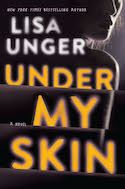
In Lisa Unger’s Under My Skin (Park Row Books) photographer-turned-agency-director Poppy Lang is mired in a nightmare: her husband, Jack, was murdered while out on a run. In the ensuing year, Poppy has been a slave to sleep-deprivation and tauntingly-missing memories; she’s also been popping pills like there’s no tomorrow. As her friends and family try to cocoon her from pursuing too many unanswered questions, Poppy wades her way through daily life in a kind of waking dream, unwilling to abandon her questions. But the danger threatening what’s left of her world is all too close and present, an ugly reality just waiting to invade. In a novel steeped in the world of photography as well as both canny and uncanny observations, Susan Sontag’s On Photography is included in the author’s Acknowledgements, and, within the story, there’s a gentle nod to George Pitts, the prolific and inspiring photographer, photo director, editor, painter, writer, and teacher.
Chicago’s VI Warshawski is on top form in Sara Paretsky’s Shell Game (William Morrow). A missing niece and deep trouble for a friend’s nephew mean that Victoria Iphigenia has two mysteries to juggle, and finds herself up against more life-threatening moments than she can count on one hand. While she’d rather be watching reruns of Kojak, Paretsky’s peerless PI comes up against some of the more toxic sides of humanity, including the arrogance of the elite, the inherent invisibility assigned to service workers, and the horrific brutality of America’s current policies: “We had become a nation of bullies.” But there’s hope here too, generated by the infallible love between a father and daughter, and through Warshawski’s own father’s words ringing cautiously, optimistically, in her ear: “Measure twice, cut once….It’s advice for life, Pepperpot.”
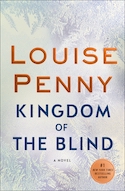
Armand Gamache, currently on suspension from the Sûreté du Québec, finds himself one of three executors of the will of a woman whose name is a mystery to him, until that particular mystery is resolved over a robust community-centered conversation in his bucolic village of Three Pines. But from small puzzles do large, ever-more excellent ones grow, especially in a Louise Penny novel: in Kingdom of the Blind (Minotaur), as Gamache does what he can to prevent a destructive amount of toxic opioid flooding the streets of Montreal, he and his colleagues chase up murder most foul, dark doings at high-class financial institutions, and an extended legal matter that puts Bleak House’s Jarndyce v Jarndyce to shame.
The Quintessential Interview: Lou Berney
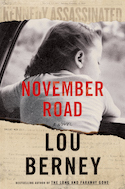
Set against the already-tense days following the assassination of John F. Kennedy, Lou Berney’s November Road (William Morrow) takes you on a searing and soul-chilling road-trip during which two disparate lives collide in a landscape populated by dark-hearted hit men, mob heads, and an emerging-from-his-shell teenager. There are incisive inclusions of Bob Dylan lyrics, and inescapably funny moments: “She needed a kind face, an encouraging word. Instead she found a sour Baptist pickle behind the motel reception desk.” Depicting the depths of a dark chapter of American history, this beautiful novel nonetheless offers promising elements of light as a rogue fixer falls for companionship, and a stifled suburban housewife finds her power, her voice, and herself.
What or who are your top five writing inspirations?
Chilly, rainy weather always gets me going. Reading a great novel will often temporarily crush my spirit but then a few hours later I’ll be all jacked up to hit the laptop. Driving through my hometown of Oklahoma City, watching an amazing sunset split open the sky – that’s when good ideas often come to me.
Top five places to write?
A coffee shop in Oklahoma City called Cuppies & Joe (it’s in a great creaky old house); my kitchen table; my back deck while my dog futilely but enthusiastically chases squirrels; airplanes and hotel lobbies (lately, while on book tour).
Top five favorite authors?
Five? Are you sure I can’t give you five hundred? Since I have to narrow it down, I’ll stick to contemporary novelists and say that five OF my favorites are Kate Atkinson, Don Winslow, Viet Thanh Nguyen, Attica Locke, and Rachel Kushner.
Top five tunes to write to?
Rosanne Cash’s version of “Long Black Veil.” “Sweet Jane,” by the Velvet Underground. “Somebody Have Mercy,” by Sam Cooke. Anything by Jenny Lewis. If I’m in a really bad spot, I’ll crank Social Distortion’s “Ball and Chain."
Top five hometown spots?
Chesapeake Arena during an Oklahoma City Thunder basketball game. One of the great indie bookstores in Oklahoma City (Full Circle, Commonplace, Best of Books). Memorial Park by the old fountain that’s been there forever (and was in a Flaming Lips video). Any pho restaurant in the Asian district. The garden behind the National Cowboy & Western Heritage Museum where legendary rodeo bulls and bucking broncos are buried.
Criminal Fiction: Fog city noir
Every month, Daneet Steffens uncovers the latest goings on in mystery, suspense, and crime fiction. See previous columns on the Criminal Fiction archive page
Reading around: new titles on the crime fiction scene
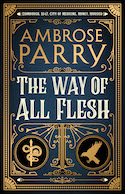
Murder most foul slimes its way through The Way of All Flesh by Ambrose Parry (Canongate), the author’s name a pseudonym for the crafty collaboration between husband-and-wife team Marisa Haetzman, an anaesthetist with an MA in the History of Medicine, and Christopher Brookmyre, author of multiple darkly humorous thrillers. The 19th-century-Edinburgh setting allows for plenty of grisly medicinal gore but also showcases a city vibrantly rich in the burgeoning fields of anaesthetics and photography, as well as ongoing religious transformations. Shimmering with lovingly-rendered historical details — watch for the conversation between a lady and her maid regarding a new novel, Jane Eyre by one Currer Bell, and the friendly neighbourhood druggist busy experimenting with fizzy lemon sherbert concoctions in his downtime – the novel more than holds its own as a compelling and twisted mystery as well.
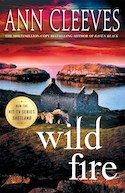
A family of “soothmoothers” newly-relocated from London to Shetland who are getting the local cold shoulder, and a chaotic neighboring family with a young nanny are just two of the domestic scenarios looming large in Wild Fire by Ann Cleeves (Minotaur). Detective Inspector Jimmy Perez, his loyal sidekick Sandy, and Perez’ colleague-turned-maybe-girlfriend Willow — who also happens to be his Senior Investigating Officer — tackle the suspicious death of a woman, beset on every side — as befitting a tiny, remote, tightknit community – with gossip, lore, and whispers of long-standing feuds and secrets. Partly inspired by Cleeves’ 70s-era residency on Shetland’s Fair Isle, the series’ final book includes a peak-a-boo cameo of the author in a canny and stirring farewell.
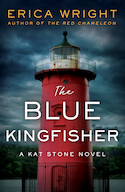
Erica Wright’s Kat Stone, just three years out from under the dangerous and suffocating work she did as an undercover cop, is making fresh inroads in New York City as a private investigator. In The Blue Kingfisher (Polis), a new case falls into her domain when she finds her apartment building’s superintendent very much DOA at the Jeffrey’s Hook Lighthouse in Fort Washington Park. A motley cast of colorful characters — including a hallucination-inducing jellyfish and a surprisingly non-carnivorous shark – and Stone’s super-snarky observations, gift Wright’s third novel with substance, entertainment, and chills-a-plenty, as Stone navigates murder on her doorstep as well as the threatening machinations of a wily drug lord.
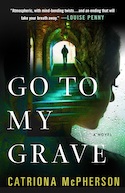
Catriona McPherson’s new standalone thriller Go to My Grave (Minotaur) features a hulking coastal estate house, newly-decorated to the gills to attract high-end clients for parties, weddings, and indulgent weekends. As the book opens, manager Donna Weaver is celebrating the fact that she’s scored bigtime with a brash group of friends and siblings celebrating a special anniversary. As creepy and unexplained impositions begin to infect the weekend festivities, McPherson, also the author of the cosy and cheeky Dandy Gilver series, deftly infuses dabs of humor within the darker horrors: she’s particularly adept when it comes to the fraught emotional baggage and dagger-sharp verbal cuts that long-time acquaintances can wage against each other – particularly when they are all apparently harboring an old, scary, and deeply-held secret.
The Quintessential Interview: Valentina Giambanco
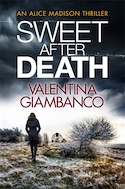
Murder most unlikely comes to the tiny town of Ludlow, Washington, in Sweet After Death by Valentina Giambanco (Quercus). In light of the underfunded law enforcement infrastructure in the area, Seattle homicide detective Alice Madison is dispatched to investigate with her colleagues DS Kevin Brown and CSI Amy Sorensen. There’s all the palpable tensions a small community generates – particularly between the townspeople and the off-grid locals – as well as genuinely explosive secrets and a landscape that just won’t quit. Plus, Madison’s own hefty emotional baggage trucks along for the ride. With a parallel career in film-editing, Giambanco has an ear for dialogue, an eye for heady visuals, and an unmissable ability for setting a page-turning pace.
What or who are your top five writing inspirations?
- Human relationships – always a never-ending source of surprising material.
- Good people doing bad things and bad people doing good things.
- Outsiders and all those who don’t quite fit in.
- The small details of everyday life – you’re sitting in the bus and you see someone doing something and go, “Oh yeah, I’m stealing that tiny gesture.”
- Wilderness and the way that, in the wild, human beings reveal who they truly are.
Top five places to write?
- The window seat on a train.
- The aisle seat on a plane.
- A particular bench in my local park.
- The New York City library on Fifth Avenue, in the lovely reading room with the brass lamps.
- My dining table, looking out of the window at the trees.
Top five favorite authors?
Only five? Okay, this is today’s list…Raymond Chandler, Louise Penny, Thomas Harris, Rory Clements, Karin Slaughter.
Top five tunes to write to?
I work better with soundtracks – no words, a lot of atmosphere. These are the five I always return to: American Beauty and The Horse Whisperer by Thomas Newman, Marathon Man and Klute by Michael Small, and The Usual Suspects by John Ottman. I could add another five, and another five after that as music is more often than not the way into a scene, a situation, a mood. I write with music, but reread without music: there’s always the danger of a dodgy piece of writing flying in under the radar because the music made it sound better than it was.
Top five hometown spots?
London – actual hometown: the gardens of St. Paul’s Church in Covent Garden; the stacks of the London Library; the main hall of the Natural History Museum; a massive, twisted old oak in my local park; Oddono’s ice-cream parlour in Northcote Road (Always ask for the hazelnut – they won prizes for it).
Seattle – U.S. hometown: the strip of pebble beach before Three Tree Point and opposite Vashon Island; Kobe Terrace park, in the third week of March when the cherry trees are in bloom; Le Pichet, French restaurant near Pike Place Market; the spot at the bow of the Bainbridge Island ferry, watching Winslow getting bigger on the horizon; a table upstairs in the Athenian Inn in Pike Place Market from where I can watch the comings and goings in the harbour.
Criminal Fiction: Rolling through it
Every month, Daneet Steffens uncovers the latest goings on in mystery, suspense, and crime fiction. See previous columns on the Criminal Fiction archive page
Reading around: new titles on the crime fiction scene
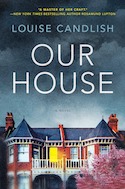
Talk about domestic suspense: from the moment that Fiona Lawton arrives home one day to find that a couple have moved in and all her belongings have been moved out (well, apart from a sad roll of toilet paper), the psychological thriller that is Our House by Louise Candlish (Berkley), hits critical mass and maintains it. Weaving back and forth between Fi’s story via a true-crime podcast and the separate narrative of her husband, Bram, will keep your mind dancing – and your heart more than a little bit petrified. There are fiendish matters afoot here and some of the darker sides of human nature are cast into startlingly high relief, but Candlish grounds her protagonists with multiple levels of empathy — for themselves and for others – that keep the storylines smartly on track.
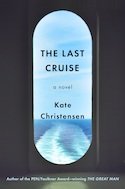
Less a crime novel than a novel with multiple crimes in it, Kate Christensen’s The Last Cruise (Doubleday) follows a handful of characters — a New York journalist-turned-Maine-farmer and her journalist bestie, a quartet of aging Israeli musicians, an ambitious chef — as they join an iconic ship for her final cruise between California and Hawaii. Trouble below deck kicks off early on, but overriding the thrilleresque plot is a quietly stunning book about power: the abusive power of ego; the generationally-channelled power of anger; the mighty and physical power of the ocean; the reinforcing, embracing power of lifelong relationships; the survivalist power of deeply-embedded training; and the redeeming, soul-quenching power of music and words and love. Excellent.
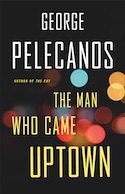
The Man Who Came Uptown by George Pelecanos (Mulholland) is rich with characters you want to spend time with: Phil Ornazian, a private investigator, and Thaddeus Ward, a retired cop, share a lucrative side-gig of robbing from the bad guys – pimps, white supremacists – to give to the baddies’ victims (and to themselves); Michael Hudson, newly un-incarcerated and treading the straight-and-narrow with cautious optimism; Anna Byrne, idealistic and approaching her own pivotal crossroads; and, neither last nor least, the thrumming city of Washington, D.C.. With these characters, Pelecanos has crafted a tale rife with certain inevitabilities as well as out-of-left-field surprises as worlds overlap, collide, and mesh. There’s criminal violence here, but also a gentle, steady tone that carries the story forward and, inherent in every page, a wise and wonderful tribute to the transformative energy of books and reading.
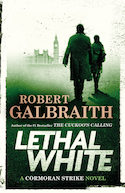
JK Rowling is clearly having as much fun writing her pseudonymous Robert Galbraith series of novels as she did while bringing the world of Harry Potter to life. Lethal White (Little Brown), the fourth book to feature the private-investigative work of Cormoran Strike and Robin Ellacott, gleefully tackles — against the hyperactive background of the 2012 Olympics — the hallowed world of London’s Houses of Parliament and the still deeply-entrenched English class system. Armed with a wild tale of a long-ago murder as well as a case of potential blackmail on their hands, Cormoran and Robin find themselves hobnobbing with people whose nicknames tend towards ‘Izzy,’ ‘Fizzy,’ ‘Torks,’ ‘Pringle,’ ‘Flopsy,’ and ‘Pong.’ As Cormoran notes under his breath, “‘Jesus Christ….It’s like interviewing the Teletubbies.’” A cracking read, wisecracks and all.
The Quintessential Interview: Stuart Turton
Stuart Turton’s debut novel, The 7 1/2 Deaths of Evelyn Hardcastle (Sourcebooks Landmark), is mind-boggling in the best way. A mash-up of imaginative gems such as Agatha Christie, time travel, and television’s sci-fi viewing pleasure Quantum Leap, the locked-estate mystery finds one Aiden Bishop persistently trying to solve a murder by embodying various host-bodies made up of fellow houseguests. In a shiver-inducing Groundhog Day aspect, the victim will die every day until Bishop figures out who’s who and what’s what. Even creepier is the creepy guy with the knife, creeping around in a seriously dastardly fashion. There’s plenty of humor in Turton’s clever tale, but some seriously unfunny business as well.
What or who are your top five writing inspirations?
It's funny, I've never thought of myself as being inspired, because I've wanted to do this for as long as I remember. My book is very much an Agatha Christie novel and I've wanted to write it since I was eight, so let's put Agatha up top. After that it gets a lot more prosaic. I write everyday because I'd go mad if I didn't; because I'd have to get an office job if I didn't; because the electricity company doesn't take 'following your dreams' as payment; and because I can't do anything else.
Top five places to write?
My study, which is just a desk, a computer, and a wall covered in plot-organising post-it notes. I hate clutter, so this is my favourite place ever. I seem to write well on long flights for some reason, so let's add that. And I always try to write in a place that has some connection to the story I'm telling. For 7 1/2 Deaths, it was a massive, decrepit manor house in the south of France which I crept around by night with a candle in my hand, scaring myself silly. It was awesome. I'll finish the list with a couple of places I like being when I look up from my screen, which includes any bar and my parent's house,
Top five favorite authors?
Depends on the day I'm having. In constant rotation are Arundhati Roy, Claire North, Franz Kafka, Raymond Chandler, and Iain Banks.
Top five tunes to write to?
Can I cheat and give bands instead? Wolf Alice, The National, St Vincent, Black Honey, Anna Calvi
Top five hometown spots?
My hometown, Widnes, is famous for making chemicals and having one of the highest rates of cancer in the country, so it's sorely lacking in nice places to visit. I rarely go back but, when I do, I tend to rotate between my parent's house, my favourite pub, The New Inn (I've been going there twenty years and I'm certain they've still got the same bar mats on the tables), the public library (which is now only open three days a week, a fact which damns our current government), the three charity bookshops in town, and the old market, where I like to eavesdrop on the local scandals.
Criminal Fiction: the smoky skies of summer
Every month, Daneet Steffens uncovers the latest goings on in mystery, suspense, and crime fiction. See previous columns on the Criminal Fiction archive page
Reading around: new titles on the crime fiction scene

Ever since Blacklands, her gripping 2010 debut, Belinda Bauer has proved over and over again that she’s a master not just of spinning suspenseful tales, but of imagining the most unsettling motivations for crimes. In Snap (Atlantic Monthly Press) – longlisted this year for the Man Booker Prize – a pregnant mother disappears and is found murdered; three years later, her three children are running feral in a house filled to the brim with old newspapers. The oldest, Jack, looks after his sisters, bringing them food and books – most recently, Stephen King’s It – via his part-time job as a small-time burglar. Meanwhile, another heavily-pregnant woman finds a disturbing note by her bedside. As multiple lives converge, Bauer keeps things progressing, and us guessing: she always seems to have just one more nifty twist up her voluminous sleeve.
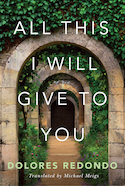
I’ve been waiting to read Dolores Redondo’s All This I Will Give to You (AmazonCrossing, translated from the Spanish by Michael Meigs), since it won the 2016 Premio Planeta literary prize and garnered all sorts of accolades as a hybrid literary-commercial thriller. A baggy doorstop at more than 600 pages and a little bit loose, editing-wise, I found that I had to stick with it at times, particularly at the beginning. Ultimately, though, it pays off in spades: the Galician setting, its scraggly landscape persistently misted in a gentle rain, is a pleasure to spend time in, and once the familial mysteries rear their compelling heads, things speed up quite a bit. There’s a tart-humored cop who’s determined to pursue a fatal case that’s been written off as accidental; a matriarch right out of a Gothic horror story; and a writer who thinks he knows everything – and then falteringly steps up to the plate as his world falls apart. A bit of a journey, but worth it.
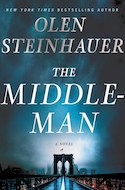
In The Middleman (Minotaur), Olen Steinhauer pulls no punches: pretty much a thriller for our time — of our time, really — this tour-de-force is a propulsive melange of the convoluted intrigues inherent in undercover work, and of forces for good battling forces for evil. The plotlines tidily juggle a suburban garden party with an organizational operation mid-action; pit the power plays of activist leaders against the political machinations behind national espionage institutions; and lets the cards fall where they may. Be sure not to miss Steinhauer’s acknowledgements which briefly but richly reflect on the current relentless political and cultural dissonance, as well as on the invaluable guidance of an astute, thoughtful, and perceptive editor.
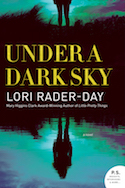
When she finds that her husband made reservations at a dark sky park for what would have been their 10th anniversary, widowed Eden Wallace decides to honor his plans on her own in Lori Rader-Day’s Under A Dark Sky (William Morrow). But what Eden thought was a private reservation turns out to be somewhat of a party house: she has a suite to herself, but is sharing communal space with a clutch of college friends. Handsome Malloy seems to be the leader of the group, the man-glue that holds things together: he’s encouraged Sam to gun for a promotion; dated Paris who is now with Dev; and basks in being the apple of Martha’s eye. But this is no Big Chill-style reunion as becomes starkly clear when one of the twentysomethings is discovered on the kitchen floor with a screwdriver in their throat. There’s nearly one red herring too many here, but Rader-Day holds the psychological-thriller-helm steady as she goes.
The Quintessential Interview: John Straley
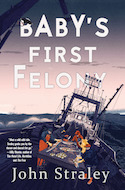
John Straley, the 2006-2008 Alaska State writer-laureate, masterfully balances semi-comic crime-caper elements with pitch-black criminal activities in Baby’s First Felony (Soho), resurrecting criminal-defense investigator Cecil Younger for his first outing in 17 years. The Sitka, Alaska, fishing industry-centered setting embraces a plethora of slightly mad, slightly bad characters, all alarmingly overshadowed by the real – and truly evil – villain. On a more informational note, the novel is shot through with entertaining ruminations on the seminal elements of Baby’s First Felony, “a self-help book….Intended for intellectually challenged criminals,” based on Younger and his boss’ experiences with their clients. (A complete and illustrated version is handily included at the back of Baby’s First Felony, the novel).
What or who are your top five writing inspirations?
I’ve been inspired by the people I met working as a criminal investigator, and by listening to stories in bars and jail cells.
I love jokes and poetry and traveling by boat.
I like talking to strangers who are reading big fat books while sitting alone in noisy cafes.
I often get my best ideas for wild action scenes while sitting in poetry readings.
Top five places to write?
I love writing at my desk which has a window looking out at a cherry tree I planted by putting a cherry pit in a stump while chopping wood long ago. Now it almost blocks my view of the water.
I like writing notes at the Backdoor Cafe while drinking black tea.
I write notes on the bench in front of the Pioneer Home on sunny days.
I write in my journal on the flimsy tables on Alaska Airlines when I’m flying to Seattle to see my eye doctor.
I used to write notes in the interview room at the Sitka Jail while waiting for a prisoner, but no more: now it’s just me and my cherry tree.
Top five favorite authors?
For years I was working on the list of books that I had lied to people about reading; I was an English major so the list was long. But by reading a lot of good books I got hooked on re-reading classic books I didn’t really understand when I read them as a student.
I have to say I still love Steinbeck, and Hemingway was a lot sadder than I had remembered. I found his stuff very moving when I went back to it. Yes, he was a pompous jerk at times, but hey, who isn’t in these times?
I got turned on to Willy Vlautinand I love his novels and how he treats people in the West. I studied with James Welch from Montana and he changed my life. His Riding the _Earthboy 40 knocked me out, and the Death of Jim Loney made me think for the first time that Western Literature was on par with what the Russians had done.
In poetry I adore Pattiann Rogers and think she is a national treasure.
Top five tunes to write to?
Now? Let me think… while I’m writing I don’t want to be too distracted by the lyrics so it has to be instrumental OR it has to be something I have listened to so much that the lyrics are just built into the background of my brain. I need soothing and then energizing tunes for different times.
- “Crosseyed Cat” by Muddy Waters
- The Goldberg Variations played by Glenn Gould
- “Streets of Bakersfield” by Dwight Yoakam and Buck Owens
- Vivaldi’s _Four Seasons with Pablo Casals
- “My Dog Can Bark” by Treat Her Right
Top five hometown spots?
My House. Really. It’s great.
I love the top of the O’Connell Bridge, which runs from Sitka over to Japonski Island, at sunset. It’s a beautiful view of the harbor and a nice walk either way.
Walk through the Sitka National Historic Park in the rain: beautiful totems, good cover, great trails.
The Pioneer Bar on a Sunday morning when it’s not crowded. Great old fisherman’s bar. They may not smoke in bars in Brooklyn or Ireland, but as of this writing they are still smoking in the Pioneer. That’s why I go in when it’s empty, and will be there when the AA crowd is drinking coffee, checking out the beautiful gallery of fishing boats on the walls.
The Be-Ak (sic) cafe on Sunday for brunch. I go there to play music with my buddies every Sunday. We play mostly blues and swing music and a smattering of gypsy jazz. Guitar, mandolin, bass, and ukulele, and anyone else who wants to jump in: old guys who are experienced players who show respect to each other and the crowd. Not too loud or too irritating. After a week at my desk, it’s my one bit of social interaction.
Then of course there’s Old Harbor Books. Great assortment of everything, with an emphasis on local and Alaska.
Criminal Fiction: Drowning in Summer's Cauldron
Every month, Daneet Steffens uncovers the latest goings on in mystery, suspense, and crime fiction. See previous columns on the Criminal Fiction archive page
Reading around: new titles on the crime fiction scene
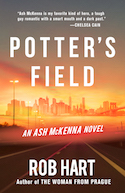
Rob Hart has stated that Potter’s Field (Polis) will be the final adventure of his heftily emotionally-baggaged freelance investigator Ash McKenna, so reading it was a bittersweet sensation: I meant to take my time and savor it slowly; instead, riveted, I bulleted through the novel in one sitting. Back on his home turf of Staten Island, Ash has every intention of heading on the straight and narrow. His short-and-to-the-point to-do, for example, list includes finding a place to live and getting a job, ideally as an apprentice to a real PI so that he can build his career properly this time around. Unsurprisingly – this guy is a magnet for misadventure – he lands neck-deep in an all-out drug war, not to mention tangling with old high-school frenemies. The music of Bronx River Parkway, the Die Hard movies, Casablanca, and pizza, lots of delicious New York pizza, lend Potter’s Field its McKennaesque feel, as does peripatetic Ash’s take-home realization: “Doesn’t matter where you live. It only matters how.”
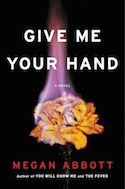
A teen friendship wrought over cross-country competitiveness and a love of science is both riven and cemented with a deep, dark secret in Megan Abbott’s Give Me Your Hand (Little, Brown). Kit Owens and Diane Fleming bond over high-school bunsen burners and deep-seated ambitions, but it’s as equally ambitious adults that the initial seeds of their relationship find full fruition in the cut-throat setting of a research laboratory. Abbott’s trademark elements of darkness in her complex protagonists shine here, with both Kit and Diane the most compelling of characters in equal measure.
Megan Abbott will be at the Lake Forest Third Street Books on July 30.
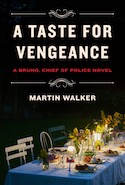
When a missing woman turns up dead in a bathroom and another body is found nearby, Bruno, chief of police in the delightfully food-and-wine-infused village of St. Denis, finds himself juggling a murder mystery and a local relationship mystery in Martin Walker’s A Taste for Vengeance (Knopf). As the murder evolves into a compelling tale of international intrigue, Walker also regales us with several cooking lessons and a tasty glimpse into an area of the world that’s reassuringly full of life, truffles, eggs, cheese, fresh vegetables, and plenty of fermented grape juice.
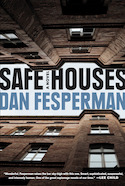
A cool and engaging spy thriller, Safe Houses by Dan Fesperman (Knopf), plays a long game, veering between recent-day America and 1979 Europe. Helen Abell, an operative in the CIA’s Berlin office is in charge of its local safe houses and takes her job very seriously. Studious, organized, and scrupulous in her check-ups, she’s startled one day by overhearing a meeting she had no involvement in planning. Then, when an unpleasant fellow spy makes extra trouble for the bureau, Helen has a conundrum on her hands. Years later, Helen’s daughter has her own adventure, uncovering the mystery of her mother’s secret life. Excellent page-turner, with incredible integrity at its heart.
The Quintessential Interview: Mick Herron
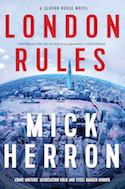
Another set of happily-rogue spooks infiltrate every inch of Mick Herron’s London Rules, number five in his terrific Slough House series, which kicks off with a breathtaking authorial set-piece, and only picks up pace from there. Central London’s Slough House may be where re-assigned (read: sent to the doghouse) MI5 agents cool their heels but, in this nest-of-spies particular case, these individual geniuses are never inactive for long. As clever and beautifully-plotted as a masterful John le Carré, and shot through with smart, canny humor.
What or who are your top five writing inspirations?
Need, curiosity, excitement, guilt, habit.
Top five places to write?
- One: My dining room table (north-facing chair).
- Two: My dining room table (south-facing chair).
- Three: No third place awarded.
- Four: No fourth place awarded.
- Five: No fifth place awarded.
Top five favorite authors?
Can’t do a top five. Could maybe do a top hundred, when time allows.
Top five tunes to write to?
- Keith Jarrett, Sun Bear Concerts: Osaka, Part I
- Arvo Pärt, Spiegel im Spiegel
- Bobo Stenson Trio, Don’s Kora Song
- Keith Jarrett, A Multitude of Angels: Torino, Part II
- Arild Andersen, Dreamhorse
Top five hometown spots?
- One: Summertown library.
- Two: Blackwell’s Bookshop (poetry section).
- Three: The canal, as it runs through Jericho, north Oxford.
- Four: The field near my home where deer graze in the evening.
- Five: My dining room table (see above).
Criminal Fiction: Sunny noir
Every month, Daneet Steffens uncovers the latest goings on in mystery, suspense, and crime fiction. See previous columns on the Criminal Fiction archive page
Reading around: new titles on the crime fiction scene
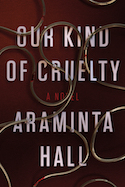
Mike and Verity indulge in an intoxicating game they call the Crave, in Araminta Hall’s Our Kind of Cruelty (Farrar, Straus & Giroux): Verity flirts publicly with an unsuspecting target and, at the designated moment, Mike comes to her rescue. Then the two of them furtively — or not so furtively — satiate their mutual passion. Obsession, manipulation, dark twists, and toxic violence mark this highly-readable psychological thriller, in which one of the twists is inextricably tangled in the narrator’s voice: the story is told by Mark, from his perspective, and the result up until the very end is downright chilling, as well as alarming on multiple levels.
There’s nothing like a child gone missing from a party to put a damper on things, which is how Cara Hunter’s Close to Home (Penguin) opens. But as the police investigation kicks off, things get infinitely more complicated. Hunter’s deep dive into the disturbed psyches embedded in our societies is gripping, and the smooth and engaged writing here will keep your nose well-tucked in this book. That, and that fact that what constitutes the mystery at the heart of the novel keeps jumping around like multiple mad red herrings in a barrel.
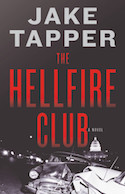
The Hellfire Club by Jake Tapper (Little, Brown) is both an engaging and slyly timely foray into Washington politics. Set in the 1950s, with cameos by such figures as Roy Cohn, John F. Kennedy, Richard Nixon, and Dwight Eisenhower, this political thriller sees Charlie Marder, a war veteran and a Manhattan-based academic, thrust into a congressional seat due to a previous congressman’s untimely death. As Charlie and his astute wife, Margaret, wend their way across Capitol Hill and cocktail parties, Tapper’s fiction debut incorporates shades of Frank Capra’s Mr. Smith Goes to Washington as well as elements of contemporary toxic alliances.
After last year’s wonderfully entertaining Magpie Murders, Anthony Horowitz has re-tuned his ultra-dexterous writing hand once again with The Word is Murder, (Harper), featuring, well, Anthony Horowitz. Having penned two Sherlock Holmes novels in real life – Moriarty and The House of Silk — Horowitz here plays a Watson-like role as semi-second fiddle to a private detective, Daniel Hawthorne, in contemporary London: he agrees to author the detective’s case in the true-crime category. It’s a doozy of a case from the get-go just on its own — a woman walks into a funeral parlor, plans her funeral, six hours later she’s been murdered. But the mystery is also chock-full of smoothly-written set-pieces, some mind-bendingly straight out of the real-life Horowitz’ worky and personal adventures and misadventures. Ace.
The Quintessential Interview: Spencer Kope
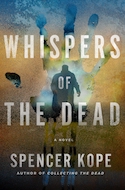
Spencer Kope’s FBI tracking star Magnus Craig can perceive people’s “shine” or aura, a color-infused trail akin to a giant fingerprint. In Whispers of the Dead (Minotaur), pairs of human feet keep turning up like bad pennies as Craig and his partner Jimmy Donovan chase a killer across Louisiana, Arizona, and Texas. Apart from his special perception powers, Craig has a way with words, an affinity for Bernard Minier novels, and, like Kope, collects first-edition books. Kope, a crime analyst as well as a writer, lives in Washington State.
What or who are your top five writing inspirations?
To answer this, I have to go back to a time when computer screens were small and monochrome, and processing speeds were measured in kilobytes, because it was the early eighties when I discovered the macabre but fascinating world of Stephen King.
I began with Skeleton Crew and Night Shift, after which I was hooked and devoured everything I could find: short stories, novellas, books, things he scrawled on napkins….Okay, I made that last part up, but you get the point. Of all the King stories I read, The Stand remains my favorite. I even liked the miniseries.
Other writers who inspire me are those who persevered: Richard Adams and his opus Watership Down come to mind. The book was repeatedly rejected before being picked up by a one-man publishing house in London; the rest is literary history. Vince Flynn is another example. He self-published his debut, Term Limits, and went on to launch the incredibly successful Mitch Rapp thriller series. Among my collection of first editions are two signed copies of this rare book.
Top five places to write?
I’ve written while aboard a nuclear-powered fast attack submarine, next to a hotel pool in the Canary Islands, at a quiet spot on the Black Sea, and at Starbucks coffee shops in several cities, but the place I’m most productive and least distracted is in my study. It’s not a grand space, but my Lord of the Rings swords are ensconced upon the wall, opposite my eight-foot storyboard for working plots and characters.
Top five favorite authors?
Such an easy question shouldn’t be so hard to answer. If I really have to choose only five, I’ll have to go with Michael Crichton, Erik Larson, J.R.R. Tolkien, C.S. Lewis, and J.K. Rowling.
Top five tunes to write to?
I can’t listen to music with lyrics for fear that my antagonist will suddenly break into song. And since a serial killer singing some twisted version of Welcome to the Jungle is not what my fans are looking for, I stick to instrumentals.
I have a playlist specifically for writing, and some of my favorites are Boadicea, by Enya, Terra Firma, Wisdom, and Eternal Odyssey, all by Delerium, and Adiemus by Karl Jenkins.
Top five hometown spots?
The Lynden Starbucks has to be on this list simply because they make me feel like Norm from Cheers whenever I walk in. Larrabee State Park, which is along Chuckanut Drive, is my favorite park, both for the drive that takes you there and the scenery once you arrive (plus I like standing in the tunnel under the tracks when the trains roll through). Village Books in Fairhaven and the newer store in Lynden are near the top of my list. Sadly, Michael’s Books, which was packed to bursting with used books, shut down a few years ago, otherwise it would make the cut. Rounding off the list is Front Street through downtown Lynden for its quaint small-town feel and Edaleen’s Dairy, where you can get massive amounts of ice cream stuffed into waffle cones.
Criminal Fiction: the sounds of violence
Every month, Daneet Steffens uncovers the latest goings on in mystery, suspense, and crime fiction. See previous columns on the Criminal Fiction archive page
Reading around: new titles on the crime fiction scene
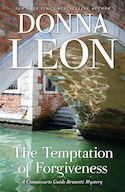
There’s something incredibly pleasurable about walking streets of Venice with Commissario Guido Brunetti as he ponders the good and the bad in people — and savors his any-time-of-day coffees — with a lovely, wry, and gentle humor. With nearly 30 Brunetti mysteries under her belt, Donna Leon is an old hand at skillfully blending the police procedural with the personal lives and interactions of her detective, his friends, family and colleagues: in The Temptation of Forgiveness (Grove), this blend is particularly seamless as a familial acquaintance of Brunetti’s drops by the station to share her concern that her son is buying drugs at school. Before you can say “coincidence much?”, a man is found in the street, unconscious, who turns out to be her husband and the boy’s father. The game, as they say, is very much afoot.
Tangerine by Christine Mangan is the kind of novel that the phrase “deeply atmospheric thriller” was made for. This assured and impressive debut, set partly in 1956 Tangier, partly in collegiate Vermont a few years earlier, tracks the arc of a friendship between two young women, Alice Shipley and Lucy Mason. They meet as college housemates and develop a friendship that’s both amiable and fraught with an underlying intensity; the ensuing tangle of emotions when Alice embarks on a relationship with a young man inevitably has a disrupting effect. But then, so does Lucy’s unexpected appearance in Morocco a year later, where Alice is living with her louche and ne’er-do-well husband. The dust, spices, souks and cafes of Tangier offer a tempting backdrop to a story that remains urgently compelling beyond its final page.
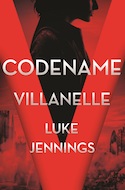
BBC America’s Killing Eve, currently getting terrific play, is based on Codename Villanelle by Luke Jennings (Mulholland), an espionage thriller that features two indomitable women. Villanelle is a sociopath and highly-trained assassin with an appropriately bleak backstory; Eve Polastri is an MI5 operative, blindsided by one of Villanelle’s high-profile murders, who vows to track the killer down. You can see in this initial book of a series how a TV version would fire imaginations: two smart, powerful women, playing a game of cat-and-mouse, and, in the case of Villanelle, with no expenses spared: her designer-name, haute-Parisian life-style is made for visual translation, as are the searingly brutal action scenes.
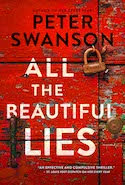
Peter Swanson finesses his increasingly dark characters in All the Beautiful Lies (William Morrow). His fourth thriller features femme fatales a-plenty, as new college graduate Harry Ackerson discovers that his father has died suddenly and a bit mysteriously. The father owned two used bookstores and loved crime fiction, and there are some wonderful literary references – including Agatha Christie, natch – as well as an fun embedded nod to a contemporary crime novelist. All this and distinct, provocative shades of Lolita, to boot.
The Quintessential Interview: Laura Lippman
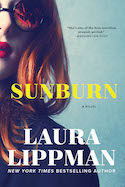
Lippman’s latest novel, Sunburn, is rightfully garnering accolades from fellow authors and readers alike. Inspired partly by the James M. Cain classics The Postman Always Rings Twice, Double Indemnity and Mildred Pierce, Sunburn radiates a sensationally cool noir vibe all its own, shimmering with a relentless undercurrent of danger, violence, sex, and heartbreak. The author of more than 20 novels, including a killer series featuring Baltimore PI Tess Monaghan, Lippman, originally from Baltimore, now divides her time between that city and New Orleans.
What or who are your top five writing inspirations?
The contract, the deadline, the deadline in the contract, the world, the idea currently uppermost in my mind.
Top five places to write?
Coffeehouses, dining room table, my own office, airplanes, hotel rooms. Yes, I prefer the dining room table to my office and I prefer planes to trains.
Top five favorite authors?
This question makes me feel like Paris, please don't make me answer it. I'm going to pick the wrong five and start a war.
Top five tunes to write to?
The sounds of silence and I don't mean Simon and Garfunkel's album. I can write amid great cacophony because I was a reporter, I can ignore music in coffeehouses, but I never choose to write to music.
Top five hometown spots?
Riverside Park, the Brass Elephant bar (circa 1992), Fort McHenry, Enoch Pratt Central Library (although it's currently under renovation) and Dickeyville, the beautiful neighborhood where I grew up.
Criminal Fiction: So many crimes, so little time
Every month, Daneet Steffens uncovers the latest goings on in mystery, suspense, and crime fiction. See previous columns on the Criminal Fiction archive page
Reading around: new titles on the crime fiction scene
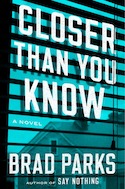
Melanie Barrick grew up partly in the foster care system, so when she arrives to pick up her son at childcare and is informed that he’s been removed by Social Services, she’s rightfully freaked out. Then, police find dealer-level drugs in her home. Barrick’s living nightmare in Brad Parks’ Closer Than You Know (Dutton) runs parallel to local law enforcement’s pursuit of a serial killer, so to mention that levels of tension run high in the novel feels almost like an understatement. A pretty-much perfectly-plotted page-turner, Parks’ latest gets part of its heart from a gentleman-lawyer as well as from Barrick’s focused determination to get her boy back.
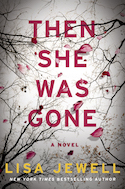
I’ve been a fan of Lisa Jewell’s writing since her 1999 debut, Ralph’s Party, and have enjoyed watching her successful shift from commercial and entertaining chick-lit — usually tinged with a cannily compelling element of intrigue — into fully-blown psychological suspense. Then She Was Gone (Atria), in which a bereaved, divorced mother, spontaneously dipping her toe in the dating pool, comes smack up against a look-alike of her missing daughter, is a terrific example of what Jewell does best: engaging characters and artful storytelling that places readers smoothly and swiftly into the middle of the action.
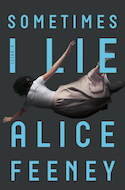
Alice Feeney’s debut, Sometimes I Lie (Flatiron), opens with a narrator who is speaking to readers from the depths of a coma. As visitors come in and out of her hospital room, she can hear what they’re saying, but can only direct her responses to us. Mere days ago, she was working on a successful radio show, feeling some trepidation about her husband’s feelings towards her; now her world is topsy-turvy in a completely unexpected way, and her bed-bound narration weaves around that of a long-ago diary as Feeney spins her creepy tale, one that’s both twisty and pretty damn twisted.
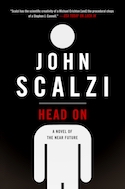
John Scalzi’s Head On (Tor), the eagerly-awaited sequel to 2014’s Lock In, sees the return of the dynamic duo of FBI agents Chris Shane and Leslie Vann. Set in an eerily possible near-future, with a large chunk of the world’s population hit by a virus that has left them with the locked-in Haden’s syndrome, Head On kicks off with death in a most spectacular fashion — think athlete, mid-game, on the field — and morphs into a snappy, cannily-driven police procedural in which Scalzi highlights and skewers contemporary issues and hypocrisies around a timely range of arenas, from healthcare, disability rights, bigotry, and racism, to the cynical exploitation and crushing of people by those with more power. Scalzi’s singular voice shines whether through his fiction, his blog or his Twitter feed, but I’m finding his elegantly-drawn, Haden-impacted world particularly captivating at the moment.
The Quintessential Interview: Alex Segura

Segura’s Pete Fernandez mysteries — recently optioned for television — are driven as much by the Miami-formed PI’s own hefty emotional baggage as by what the baddies of focus are up to. Blackout, Fernandez’ fourth misadventure after Silent City, Down the Darkest Street, and Dangerous Ends, is no different: the level of intensity is high, the level of sanity is low. Caught in a quagmire that includes a Scientology-like cult, a gunning-for-more politician, a long-dead high-school acquaintance of Fernandez and, yes, a soft-hearted but ambitious stripper, Segura’s latest offers a mind-spinning mix of dark and darker elements – not to mention multiple literal head-blowing moments, and, part-way through, a super-shocking surprise. But there’s more to Segura than meets the noir-ish eye: his other job encompasses writing and editing for Archie Comics, including the music-infused Archie Meets KISS and Archie Meets Ramones.
What or who are your top five writing inspirations?
- My family.
- Nonfiction books — history, true crime, biographies.
- Music.
- Miami.
- The news.
Top five places to write?
- At the dining room table.
- Coffee shop.
- In bed, scribbling in a notebook before the idea fizzles/I fall asleep.
- In my office.
- On the train, crafting an email to myself so I don't forget something. Frantic writing happens a lot.
Top five favorite authors?
- Raymond Chandler
- Elmore Leonard
- Jim Thompson
- Laura Lippman
- George Pelecanos
Top five tunes to write to?
I don't write to music — I try my best to achieve absolute quiet, which, look, doesn't exist when you have a toddler. But I do often think about music while writing. Here are the first five that pop into my head, as it's a constantly-morphing list.
- The Replacements, "Within Your Reach"
- Elvis Costello, "I Hope You're Happy Now"
- Miles Davis Quintet, "Four"
- Liz Phair, "Divorce Song"
- Johnny Cash, "Jackson"
Top five hometown spots?
- Versailles: Hands down, the best Cuban restaurant in Miami.
- Wynwood: Miami's evolving art district/neighborhood is a testament to how much the city's changed since I moved to NY. A reminder that I always have to stay focused on what the city is like now, as opposed to how I remember it. It's also just a cool stretch of restaurants and night spots...said the sleep-deprived dad of a toddler.
- Miami Book Fair: One of my favorite events of the year, and a must-do for booklovers.
- Marathon Key: The closest we can get to complete relaxation.
- Books & Books in Coral Gables: I've been hanging out at this bookstore since I was in college. A literary landmark in Miami if there ever was one.
Criminal Fiction: welcomes, congratulations and farewells
Every month, Daneet Steffens uncovers the latest goings on in mystery, suspense, and crime fiction. See previous columns on the Criminal Fiction archive page
Kicking off this month, the brand-new LitHub site, CrimeReads includes a monthly column from Sarah Weinman; congratulations are in order to Michael Connelly, winner of this year’s CWA Diamond Dagger; and finally, crime fiction loses a literary hero in Peter Temple.
Reading around: new titles on the crime fiction scene
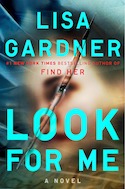
A family murdered nearly en masse, a missing teen and two determined women — one a cop, one a crime-survivor-turned-advocate-cum-avenger — make Lisa Gardner’s Look For Me (Dutton), a pacey, tautly-written mystery and quite the suspenseful humdinger. At its heart is not just a family story but a story about what makes a family, as well as a wonderful testament to the terrific work done by Court Appointed Special Advocates, the volunteers whose critical work protects children’s rights to a safe, healthy living environment.
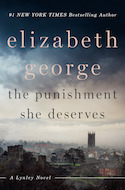
Elizabeth George’s latest Detective Lynley and Detective Sergeant Havers mystery, The Punishment She Deserves (Viking), begins with something a bit different. Havers is carted off by her superior officer and workplace nemesis, Detective Chief Inspector Isabelle Ardery, to the mellow Shropshire town of Ludlow to investigate the apparent suicide of a suspect in police custody. As the tension between the two detectives escalates — Ardery is determined to make this an open-and-shut case, while Havers’ detecting hackles hit the stratosphere as more and more odd characters and coincidences emerge — personal baggage takes over. Always terrific with her regulars’ private foibles and lives, George ups the ante here with multiple families all circling the drain of one particularly horrific set of crimes.
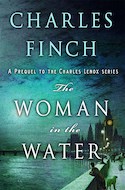
Murders on the Thames feature prominently in Charles Lenox’s origin story. In The Woman in the Water by Charles Finch (Minotaur), the 23-year-old Lenox — semi-party-boy by night, aspiring detective by day — is busy trying to establish his fledgling career and his foothold both in London’s social (read: disapproving) scene, and in the early (read: scornful) Scotland Yard. It’s enormously fun and emotionally engaging to follow Lenox, soon to become one of London’s redoubtable — if fictional — private detectives, as he navigates the murky depths of his first official case while grappling with one of life’s hardest lessons: “‘The hardest part of losing a person, Charles,’” as his father tells him, “‘is that grief is only an absence. There is nowhere to go to touch it. There is no cut that you can watch close over.’”
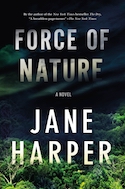
I loved Jane Harper’s The Dry, and Force of Nature (Flatiron) is an excellent follow-up. Federal Agent Aaron Falk and his partner Carmen Cooper, in pursuing their latest white-collar-crime case, have been engaging with a potential whistle-blower. When that whistle-blower goes missing during a corporate retreat in the Australian bush — in an area where a serial killer once stalked his prey, no less — the stage is set for a subtle thriller that combines a tense police investigation with the even more strained events leading up to the woman’s disappearance.
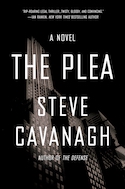
In Steve Cavanagh’s The Plea (Flatiron), lawyer Eddie Flynn, a former con artist, is tapped by the FBI to help them bring down a massive financial crime scheme, but it means treating possibly innocent people as collateral damage. Flynn, who has been blackmailed into acting on others’ behalf before, is no dummy, but he needs all his smarts for this wild ride. A nasty bit of murder, some dirty politicking, and some seriously twisted plot twists make this courtroom-dramatics-meets-con-game-antics a speedy and superbly satisfying read.
The Quintessential Interview: Eva Dolan
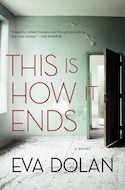
Eva Dolan’s terrific police procedural series featuring DI Zigic and DS Ferreira and their Hate Crimes Unit is a critical and well-respected hit in her native UK. Her US debut, This Is How It Ends (Bloomsbury), is a standalone mystery, addressing the accelerating — and socially damaging — gentrification of London, as seen through the eyes of two female activists who are trying to keep a partly-inhabited, low-income apartment building from being torn down.
What or who are your top five writing inspirations?
Anger is the big inspiration. Injustice. The desire to write about victims mostly ignored because they’re outsiders or at the ‘wrong’ end of the social spectrum. Wanting to do something different, even if it’s almost aggressively uncommercial. The sheer, bone-deep stubbornness of doing what I think’s right and balls to the consequences.
Top five places to write?
I would love to be the kind of writer who can work anywhere but I’m a creature of habit with very specific requirements when I sit down to actually type a book: that’s sitting on the sofa with my laptop on a cushion across my thighs. Despite the office I insisted on claiming, the lovely big kitchen table – where there’s also immediate access to coffee and biscuits – or the pretty Victorian library we’re lucky enough to still have in my nearest town and the welcoming 16th century coaching inn nearby, I couldn’t work in any of them. It’s the sofa for me.
Top five favorite authors?
Ian Rankin’s Rebus series is a huge inspiration — they were the first detective novels I read and were a template for how to write working-class crime fiction. In the same vein, John Harvey’s Resnick series really brought home to me how you can put social issues at the heart of a book and still make a compelling, driven narrative. Patricia Highsmith for psychological intensity. Cormac McCarthy for relentless commitment to the dark side. And Raymond Chandler for his depiction of sleaze in gorgeous prose.
Top five tunes to write to?
Vocal music is really distracting so I tend to go for stuff that’s mostly instrumental or, at least, unobtrusively vocal:
Anything by Mogwai, but The Hawk Is Howling is the album I listen to most often. Early Underworld, especially Second Toughest in the Infants. Massive Attack, all albums on repeat. Dirty Three have been a major find of the last few years, haunting, ethereal music underscored with a visceral sensuality — check out Horse Stories as a starting point — and in a similar vein, Warren Ellis’ and Nick Cave’s brilliant White Lunar.
Top five hometown spots?
I live in a tiny village without any amenities, so the place I tend to go most frequently is Stamford, a lovely market town a short drive away. It’s been voted the best place in the UK to live and it’s easy to see why: great restaurants and cafes, brilliant independent shops and some gorgeous Georgian architecture – fans of Jane Austen will have spotted it as the backdrop to the latest film version of Pride and Prejudice.
My bolthole there is The George Hotel’s gorgeous wood panelled and chestnut leather bar; the building dates back to the mid-10th century and almost hums with its history. I go here almost weekly for a pot of excellent hot chocolate and amaretto and tend to do a lot of my plotting in the lounge in front of the fire.
Another place steeped in history is the local Arts Centre, which has a beautiful ballroom where classes are held and a popular café serving great snacks. I’m also a big fan of its intimate little cinema, which shows classics and new movies in a very civilised setting.
This is becoming a theme but the Tobie Norris pub is a top choice for lunch and where I tend to take visitors. The menu is eclectic and always outstanding and the building itself is the quintessential English country inn, dating back to 1280, all nooks and crannies and history seeped into its stones.
Walkers Bookshop is a tiny independent which stocks a very respectable range for its size and also has a wide selection of chocolate for sale on the ground floor. I sneak in here for spur of the moment purchases and new Moleskine notebooks and to check if my friends’ books are in stock. They still don’t know I’m a local writer.
The Town Meadows is a small park in the fork of the River Welland and one of the most peaceful places in Stamford. When I was little my parents took us there to feed the ducks and the gaggle of aggressive geese which run the place. Now it’s a nice spot to pause and take a breath between the shops and a café, maybe play with one of the dogs which run around the grass there. I’m a sucker for other people’s pooches.
Criminal Fiction: All in the family
Every month, Daneet Steffens uncovers the latest goings on in mystery, suspense, and crime fiction. See previous columns on the Criminal Fiction archive page
Including both James Lee Burke and Alafair Burke in this column got me thinking of other mystery-writing family ties. Whether it’s a collaborative, mother-offspring effort a la Mary Higgins Clark-Carol Higgins Clark , PJ Tracy (see also this), and Charles Todd or an all-in-the-family business, it’s dead good fun to imagine those in-the-writing-studio and dinner-table conversations.
Reading around: new titles on the crime fiction scene
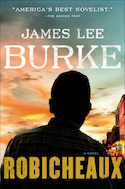
A new Dave Robicheaux novel is always an immersive pleasure. From Robicheaux’s keeps-him-on-his-toes relationship with daughter Alafair and his deep friendship with buddy Clete Purcel to his quasi-homebody existence in Southern Louisiana, a new Robicheaux tale is akin to hanging with a beloved, familiar friend — well, with some violence and criminal activities thrown in for good measure. James Lee Burke’s Robicheaux (Simon & Schuster), shivers with the dastardly deeds of nefarious no-goodniks as well as with the possibility that Robicheaux may have mishandled a deadly situation. The choice range of supporting characters come thick and fast, as do the unwavering stabs at the hideous levels of corruption in Louisiana politics. One of my favorites among a multitude of compassionate touches: a singular Clete-related reference to the Just Men of Jewish legend.
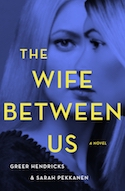
The Wife Between Us (St. Martin’s), a tidy and terrifically twisty psychological thriller, is also an impressive, double-handed effort: Greer Hendricks, a former book editor, and Sarah Pekkanen, a best-selling novelist and former investigative journalist, have put their literary heads together, creating an enjoyably electrifying, page-turning ride with cannily-chosen details. These days it takes a little something extra to offer up an intriguing novel of domestic suspense, and this book has it in spades. Oh yes.
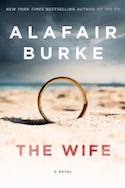
Alafair Burke’s The Wife (Harper) features a critical cameo by Olivia Randall, the intriguing protagonist of Burke’s 2017 mystery The Ex, but this whiplash-inducing tale — in a good way — belongs wholeheartedly to Angela Powell, a woman with everything she ever wanted, including marriage, motherhood, and a fairly high-falutin’ Manhattan lifestyle. But not-so-behind-the-scenes, a perfect storm of sexual harassment accusations against her husband and past deeds long since swept under the proverbial rug may be coming home to roost. While utilising fun pop culture references – that unforgettable eyelid moment in Raiders of the Lost Ark, an arch Hunger Games comment — Burke maintains an even hand here, nicely sprinkled with the multiple deftly-doled surprises up her cavernous sleeve.
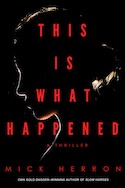
I’m a massive fan of Mick Herron’s excellent British spy/Slough House series. This Is What Happened (Soho), a standalone thriller, draws on his incisive spymaster knowledge as well as other imaginative forays, and uses the mean streets of contemporary London to their utmost advantage. Protagonist Maggie Barnes – independent, smart, and ever-so-slightly emotionally vulnerable – is the perfect recruitment target for certain MI5 missions and she accepts her destiny with alacrity. It’s what happens next that leads deep into a startling and engrossing rabbit hole.
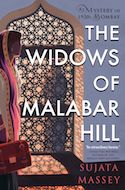
The wonderful Widows of Malabar Hill by Sujata Massey (Soho) is the first in an enticing new series: Parsi Preveen Mistry has joined her father’s law firm in 1920s Bombay, a position fraught with challenges, including her attempt to attend law classes at the Government Law School. When someone turns up dead at the secretive home of one of Preveen’s father’s clients, she’s handed an unusual opportunity: the wives of the household live in strict purdah, but, as a woman, Preveen can speak with them directly. A rich blend of history and fiction, Widows brings historical Bombay to vibrant life in this engaging mystery.
The Quintessential Interview: Meg Gardiner
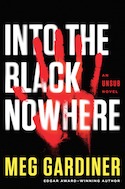
Austin-based Meg Gardiner had already published 12 terrific mysteries when she kicked off her chilling new series last year with the unnerving UNSUB, introducing Bay Area detective Caitlin Hendrix and a serial baddie known as the Prophet. In Hendrix’s second outing, she’s testing her mettle as a rookie FBI agent with the organization’s Behavioral Analysis Unit, but the killer she’s chasing is no less creepy than her previous nemesis. On a more personal level, she’s now balancing a bi-coastal relationship with bomb-explosive-specialist boyfriend, Sean Rawlins.
What or who are your top five writing inspirations?
Families. The seven deadly sins. The shadowed depths of the human mind. The hero’s journey. Sue Grafton.
Most of my top five are source material. But Grafton’s books both thrilled me and showed me there was a place for women writing modern crime fiction. She inspired me to write my own novels.
Top five places to write?
- My office, when the red-shouldered hawk is perched in the trees outside, eyeing me.
- A coffee shop buzzing with white noise and caffeine.
- My kitchen table, sixty minutes before the school bus drops the kids off. When the clock is ticking, I can write like a maniac.
- An airplane, with a printout and a pencil. Never a pen. Not since my rollerball blew up on that Southwest flight. Folks: ink and altitude don’t mix.
- Behind the backs of my eyes as I wake up in the morning. When the world is still and dreams are fresh, answers to problems in the story reveal themselves.
Top five favorite authors?
Stephen King, James Lee Burke, Sara Paretsky, Don DeLillo, Elmore Leonard.
Top five tunes to write to?
- “Mr. Brightside,” The Killers
- “Megalomaniac,” Incubus
- “Wheels,” Foo Fighters
- “Like the Way I Do,” Melissa Etheridge
- “Stormy Haze,” Ray Prim
Top five hometown spots?
Torchy’s Tacos. The Half Step on Rainey Street, when the band’s playing jazz. The LBJ Museum. The hiking trail around Lady Bird Lake. Book People.
Criminal Fiction: The best of the quintessential interviews
Every month, Daneet Steffens uncovers the latest goings on in mystery, suspense, and crime fiction. See previous columns on the Criminal Fiction archive page
Daneet Steffens is taking a well-earned month off. But don’t worry — you can still get your Criminal Fiction fix. Browse the archives for more than a year’s worth of recommendations; Daneet casts a wide net, and every column is a gem: a handful of smart short reviews and an interview with a writer of note, topped by a recap of genre news, a list of essential articles, or a podcast worth your time (follow her on Twitter for a constant feed of the same great stuff).
Here are just a few of our favorite “quintessential interviews”:
- Ruth Ware: "I love a pub with a proper beer garden."
- Elizabeth George: "I write in silence unless my dog starts barking."
- Dennis Lehane: "There are at least 700 songs on my Infinite Writing Playlist."
- Chris Holm: "I’m fascinated by what drives good people to do bad things. By how bad one can be without becoming irredeemable. By the slipperiness of identity and what we consider to be our essential selves."
- Justine Larbalestier: "Never have more than one psychopath: it strains credibility."
- Lori Rader-Day: "What people whisper about is what they care about."
See you next month!
Criminal Fiction: Year ending
Every month, Daneet Steffens uncovers the latest goings on in mystery, suspense, and crime fiction. See previous columns on the Criminal Fiction archive page
December heralds best-of-year lists; when it comes to crime fiction, here are a few of my favorites from Irish critic Declan Burke, The New York Times’s Marilyn Stasio, and The Guardian’s Mark Lawson.
Reading around: new titles on the crime fiction scene
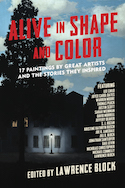
I love the concept of the Lawrence Block-edited anthologies In Sunlight or in Shadow: Stories Inspired by the Paintings of Edward Hopper and Alive in Shape and Color: 16 Paintings by Great Artists and the Stories They Inspired, and I like the implementation even better. For the latter, Lawrence Block organized the participation of a stellar lineup of writers — including Sarah Weinman, Lee Child, Michael Connelly, Nicholas Christopher, Jeffery Deaver and Joyce Carol Oates — and the outcome is a bevy of cool and canny tales that embrace – to name just a few of the topics – art heists, familial relationships, historical intrigue and the seemingly straightforward interactions on a good old-fashioned crime scene. Dip in, dip out, and then dip in yet again. Multiple treasures here.
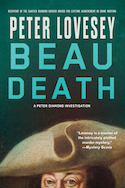
It’s a turn for the history books when a skeleton is discovered wearing 16th Century garb in Peter Lovesey’s Beau Death (Soho): Bath-based Chief Inspector Peter Diamond considers that he may have an age-old mystery on his hands, one involving the city’s most controversial iconic figure, Beau Nash. Diamond’s wry sense of humor stands him in good stead — especially when dealing with the eccentric, arrogant members of a historical society — and the intra-police interactions during the investigation are as enjoyable as the slightly madcap mystery at hand.
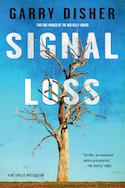
In Signal Loss (Soho), a gloriously gritty Australian-based police procedural, Garry Disher juggles multiple ongoing crime-story strands, leading his detectives on several not-so-merry chases across a dusty, rural backwater. There’s a deeply disturbing meth problem, cold-blooded murder and black-hearted deception — not to mention a slimy serial rapist on the loose. Sergeant Ellen Destry and Inspector Hal Challis and their teams have their hands full, and a striking opening scenario offers up a ghoulish Mr. Wint and Mr. Kidd — that entertainingly deadly duo of Diamonds Are Forever fame — partnership for the 21st century.
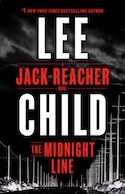
By far the best thing about Jack Reacher novels is that way in which they begin with utter simplicity – Reacher coming across a West Point class ring in a pawnshop, for example – which then evolves into tales of wonderful complexities. The Midnight Line (Delacorte Press) is the perfect example, as Reacher, that class ring in pocket, wends his way across South Dakota and Wyoming, taking in the majestic landscape, collecting friends and enemies along the way, while demonstrating a most impressive use of a tumble dryer. ’Nuff said.
The Quintessential Interview: Joanna Schaffhausen
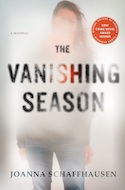
Joanna Schaffhausen’s creepy debut features Ellery Hathaway, a small-town cop who, in years ago, was the sole survivor of a serial killer. Even with her tormentor behind bars, Ellery’s living nightmare returns: for three years running now, someone has vanished from her new hometown, right around Ellery’s birthday. A cunning police procedural as well as a grisly murder mystery by the 2015 Minotaur Books/Mystery Writers of America First Crime Novel winner, The Vanishing Season is one seriously chilling chiller.
What or who are your top five writing inspirations?
- True crime stories
- Reading great writers across all genres
- Travel
- Family — the ties that bind in good and bad ways
- Neuroscience/psychology — all studies of the weird human brain
Top five places to write?
- With my laptop on the bed
- On the train (my commute is 3 hours a day)
- In my head
- At the library where it’s quiet
- In front of a roaring fire
Top five favorite authors?
- Shakespeare
- Fredrik Backman
- Jhumpa Lahiri
- Liane Moriarty
- Ed McBain
Top five tunes to write to?
This would be silence, silence, silence, silence, and silence. I love music but I’m an active listener. If I’m busy paying attention to the songs, I can’t hear the voices in my head. That said, here are five songs I find inspiring as a writer:
- The Hamilton soundtrack
- Beethoven’s Fifth Symphony
- “The Times They Are A-Changin’” by Bob Dylan
- “All These Things That I’ve Done” by The Killers
- “Time After Time” by Cyndi Lauper
Top five hometown spots?
- Boston’s Museum of Science
- The Harbor Islands
- Fenway Park
- Top of the Hub
- Sanders Theatre in Harvard Square
Criminal Fiction: Winter in review
Every month, Daneet Steffens uncovers the latest goings on in mystery, suspense, and crime fiction. See previous columns on the Criminal Fiction archive page
Winter’s shorter days are a terrific time to dig into writer interviews, old and new. One of my favorite bookish series is the New York Times’ "By the Book" column, which embraces a rich selection of crime-fiction authors including Louise Penny, Don Winslow, Michael Connelly, Paula Hawkins, and Philip Kerr.
And it’s in a different format and less high-profile, but the fall issue of Johns Hopkins Magazine has a fascinating interview with Chester Himes biographer Lawrence Jackson.
Finally, as someone who got to visit the first two UNESCO Cities of Literature, Edinburgh and Melbourne, on a wonderful work trip and appreciating what this particular recognition entails, it’s terrifically exciting to see Seattle welcomed into that particular fold.
Reading around: new titles on the crime fiction scene
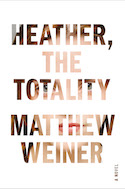
Mad Men creator Matthew Weiner’s debut novel, Heather, the Totality (Little, Brown), may be slim but it packs a substantial punch. This is a tale in which every character — the eponymous Heather, her parents Mark and Karen, and a dude from the other side of the tracks, Bobby — has an oddly creepy element to them, so as a reader, there’s nowhere to hide. It is also a trenchant reminder of the critical damage an excess of obsessiveness can do, no matter who you are or what your intent might be.
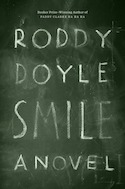
A lonely man hangs out in his local bar, in Roddy Doyle’s Smile (Viking), bathed in memories of his no-longer-existent happy, indulgent relationship. He was a writer, a music critic; she succeeds as a celebrity chef, television series and all. As the book opens, he’s hit rock bottom, keeping a bar-stool warm, when someone from his past recognizes him and strikes up a conversation. Where that conversation goes in this novel of psychological suspense may or may not surprise you, but Doyle’s portrayal of a loving, intimate, empathetic relationship and its original inspiration — the longing of a human heart — will stick in your mind long after the final page.
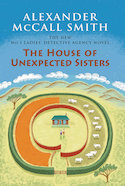
Mma Ramotswe, she of the No. 1 Ladies’ Detective Agency in Gabarone, Botswana, gets caught up in multiple intriguing mysteries in Alexander McCall Smith’s The House of Unexpected Sisters (Pantheon). Why was a hardworking employee suddenly fired — and was it even legally done? Why is someone from Mma Ramotswe’s past turning up like a bad penny? And who is the mystery lady who shares Mma Ramotswe’s name? Ably abetted by her partner-in-crime Mma Makutsi, as well as by friends and family, and armed as always with wisdoms from Clovis Anderson’s The Principles of Private Detection, Ramotswe brings a curious mind and an attentive heart to her work, not to mention plenty cups of comforting redbush tea.
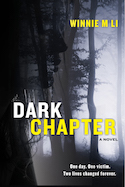
In her acknowledgements, Winnie M Li makes it abundantly clear that her debut novel Dark Chapter (Polis), which begins with the rape of an adult woman, Vivian, by a teenage boy, Johnny, is drawn from personal experience. If anything, this makes the story — which, while nerve-shreddingly explicit in terms of the assault, focuses primarily on the aftermath for both the woman and the boy — all the more raw in its intensity. Despite wandering into stereotype-territory at times, Li’s also produced a riveting, highly empathetic read, one that recently won the UK’s prestigious Not the Booker prize.
The Quintessential Interview: Jon McGregor
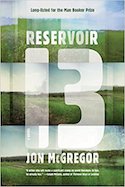
On a cold winter’s day, a young girl goes missing near a rural English village. Through the searches and the perpetually open police investigation, her parents seen as both despairing and under suspicion, McGregor delineates the lives and times of the locals: villagers fall in and out of love, lose their jobs and gain new ones; flocks of birds fly south and return, badgers settle in their setts, and newborn foxes tumble over each other in their dens. In Reservoir 13, McGregor, a terrific novelist with the pen of a poet, has woven a mesmerizing tapestry, a tale not so much about a mystery, as about the sometimes-lingering repercussions that a crime can have on the community around it and the inexorable passage of time. McGregor is based at the University of Nottingham, where he also edits the excellent epistolary literary journal The Letters Page.
What or who are your top five writing inspirations?
- For this book in particular, Tom Drury and John McGahern were high on the list
- Readers who got what I was trying to do last time
- Readers who didn't get what I was trying to do last time
- The fear of alternative employment
- Also, coffee
Top five places to write?
- Anywhere with a flat surface, some background noise, and good coffee
- The Specialty Coffee Shop in Nottingham
- Cartwheel Coffee in Nottingham
- Bromley House Library in Nottingham
- Long-distance trains if I've packed a flask of good coffee
Top five favorite authors?
- Lydia Davis
- Alice Oswald
- Tom Drury
- Yiyun Li
- Donald Barthelme
Top five tunes to write to?
- Diamond Mine by Jon Hopkins and King Creosote
- Born into Trouble as the Sparks Fly Upwards by The Silver Mt. Zion Memorial Orchestra & Tra-La-La Band.
- Shakkei by Origamibiro
- Forty Part Motet by Thomas Tallis
- You Are the One I Pick by Felix (fyi these are all albums but if I had to keep getting up to change tracks I would never get any writing done)
Top five hometown spots?
- Broadway Cinema for films and food and bumping into people
- Specialty Coffee and Cartwheel Coffee for amazingly good coffee
- Iberico World Tapas for fine tapas and a place to go with the best company
- Sherwood Forest for getting back in touch with the trees and pretending to be an outlaw
- The Pillar Box for excellent gin and raconteuring
Criminal Fiction: a door closes
Every month, Daneet Steffens uncovers the latest goings on in mystery, suspense, and crime fiction. See previous columns on the Criminal Fiction archive page
It’s already been acknowledged on these pages, but I, along with a zillion others, was sad to see the Seattle Mystery Bookshop shutter its doors. While it’s hardly an unusual tale for an independent shop these days, I appreciated the business’ detailed and often thought-provoking blog, and appreciated, even more, the final post. We’ll miss you, Seattle Mystery Bookshop. We’ll miss you.
Reading around: new titles on the crime fiction scene
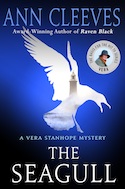
The latest Vera Stanhope mystery, The Seagull by Ann Cleeves (Minotaur), holds a particularly tasty treat: a welcome and more intensive glimpse of the life and times of Vera’s father, Hector. An avid bird-and-egg collector — not entirely legally, mind — Hector ran around with an unsavory but untouchable bunch, including a high-level police officer, a wily wheeler-dealer dude, and a posh gentleman known only as “the Prof.” He also, as it turns out, managed to be an even grumpier grump than Vera, outshining her curmudgeonly reputation on several counts. Vera handles the family baggage surprisingly well as she delves into a long-hidden unsolved mystery, tackling old-school corruption, organized crime, and a local town’s earlier heyday as a seaside resort.
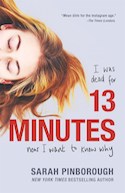
Sarah Pinborough’s Behind Her Eyes, with its heart-stopping twists and highly unreliable narrators, was one of this year’s most whiplash-inducing, adult psychological-suspense novels. With 13 Minutes (Flatiron), Pinborough returns to her YA stomping grounds, and spins teenagers’ tenterhooks and the toxicity of high school into a mind-teasing thriller. Natasha, Hayley, and Jenny are the Barbies, their version of similar cliques portrayed cinematically in Mean Girls and Heathers. But when Tasha nearly drowns and re-friends her childhood bestie, Becca, the stage is set for teen-angst-fuelled intrigue, sex, drugs, and, perhaps, even murder. Just for fun, cast the characters with your preferred actors — film rights have already been sold to Netflix.
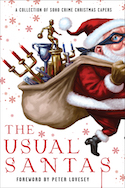
The holiday-infused collection The Usual Santas (Soho Crime), gathers the cream of Soho’s international crime-writing crop, from Stuart Neville and Cara Black, to Helene Tursten and Ed Lin. There’s a canny little heist scene in Cuba from Teresa Dovalpage; a tale of heart-freezing revenge in Manhattan’s Chinatown by Henry Chang; a highly-debatable good-deed-done tale in a remote American ski hamlet by Tod Goldberg; a trip to 16th Century Italy by Gary Corby; and a visit to Jane Austen’s Bath by Stephanie Barron. With a festive multitude of short-story gems to choose from, the honor of best line resides in the book’s eponymous narrative from spy-writing master Mick Herron, in which a plethora of shopping-center Santas, whooping it up on Christmas Eve, realize that something is not quite right: “There’s an elf behind this,” said [one of the Santas]. “Mark my words.”
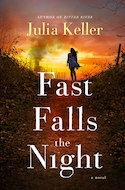
Julia Keller tackles one of the biggest crimes currently being committed in America in Fast Falls the Night (Minotaur). The devastating, destructive opioid crisis drives this novel, localized in Acker’s Gap, West Virginia, but recognizable across the country. Over a single night and day, as multiple victims succumb to an often-fatal batch of heroin, Prosecutor Bell Elkins and her colleagues race against time to discover the source. Keller delineates the infinite and highly personal experiences impacted by drug addiction – in a town this small, no one is unaffected — as she captures the hopelessness, the stifling, dead-end atmosphere of the situation, and the determination of a bold few to address the crisis while secreting several mysteries of their own.
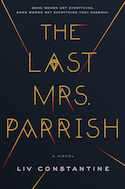
Amber Patterson is onto a good thing in The Last Mrs. Parrish by Liv Constantine (Harper). She’s insinuated herself into the life of the outrageously wealthy Mrs. Daphne Parrish by devious means, angling to replace her as the next Mrs. Parrish ASAP. What stands in her way? Just two suspicious young daughters, Bella and Tallulah, and the conscience of Daphne’s husband, Mr. Jackson Parrish, who clearly adores his wife. In the Parrish family’s opulent, water-front mansion, in their luxurious Manhattan apartment, in Jackson’s beloved motorboat – everywhere the family turns, there Amber is, transforming herself from mousy and timid to glam and glorious, right before their eyes. The latest in a wildly proliferating line of sociopathic characters convinced they are smarter than everyone around them, this is a pleasurably soap-opera-ish thriller from two sisters, Lynne and Valerie Constantine, who clearly had a good deal of fun putting this tale together.
The Quintessential Interview: Joe Ide
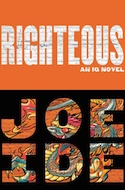
Private eye Isaiah Quintabe’s beat is a rough-and-ready L.A. neighborhood; his best friend and sort-of-partner, Dodson, is about to become a father; and IQ’s determination to solve the decade-old homicide of his older brother is gathering heat. Thus opens Righteous (Mulholland Books), Joe Ide’s second fiery IQ novel in which, to add grist to the investigative mill, Sarita, his brother’s former girlfriend, reaches out for his help, generating an inquiry that encompasses the seamier underbelly of Las Vegas as well as inter-gang warfare. IQ’s smarts serve him in good stead, and it’s excellent fun to watch sidekick Dodson’s resolution to keep up. The other latest reason that Joe Ide is in the news: IQ, Ide and Isaiah’s debut, just won the Anthony Award for Best First Novel.
What or who are your top five writing inspirations?
- Walter Mosley. The original cool breeze. He taught me that it was possible to write a book about an environment like ours and people like the ones we knew, and that there was a readership who would enjoy it. Also, he created Easy Rawlins, the second, original cool breeze. Mosley also taught me that you can wear a fedora and a T-shirt to a black-tie event.
- Elmore Leonard because he writes about lowlifes that are so real they slap you in the face and his dialogue is the best ever.
- John le Carré. I love his precision and intricacy and the tension he creates without violence. He also came up with my third favorite character of all time, just behind Sherlock Holmes and Christopher Robin: the quixotic, emotionally disabled, brilliant George Smiley.
- Don Winslow. He’s just good, that’s all.
- And a tie between Janet Fitch and Mary Karr. Mary Karr for her hilarious, tragic, trailer-trash, so-true-it-hurts biographies, and the writing, the writing. And Janet Fitch for her deeply felt quintessential L.A. novels about quintessential LA characters and the writing, the writing.
Top five places to write?
There are only two. My study with the shutters closed and the door shut and ear plugs in my ears, and the dog underneath the desk as a foot rest. And my outdoor office: a wooden table in the shade of the maple tree and underneath the hummingbird feeder where I am occasionally interrupted by my friend, Hummie (I’m good with names) who is quite used to me now, the dog lying in the cool, damp spot underneath the ferns.
Top five favorite authors?
Elmore Leonard, Walter Mosley, John le Carré, Hunter S. Thompson and A.A. Milne.
Top five tunes to write to?
No music. I’ll sing along or bob my head or tap my foot and I have enough trouble focusing as it is.
Top five hometown spots?
At the moment, Tacos Por Favor; Petty Cash Taqueria; Los Originales Tacos Arabes de Puebla; Sushi Sasabune; and the park along the bluffs in the Palisades overlooking Santa Monica Bay.
Criminal Fiction: killer podcasts
Every month, Daneet Steffens uncovers the latest goings on in mystery, suspense, and crime fiction. See previous columns on the Criminal Fiction archive page
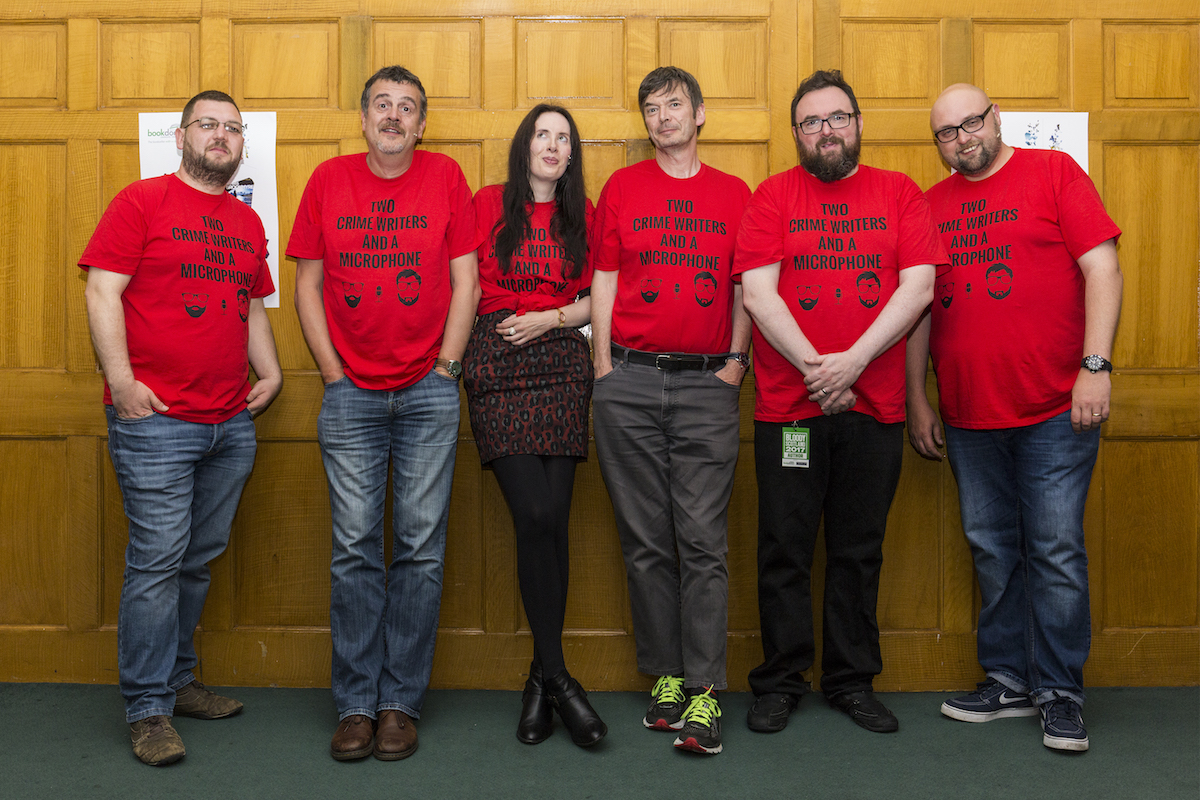
Photo credit: Paul Reich. L to R: Veste, Billingham, Dolan, Rankin, Neville, Cavanagh.
Kudos to Denise Mina for winning Bloody Scotland’s McIlvanney Prize for the best Scottish Crime book of the year. Her terrific The Long Drop is a beautifully-paced, novelistic slice of 1950s Glasgow, as well as an astute re-imagining of a real-life crime that riveted the city (and, to some extent, still does). Cheekier kudos are due to the Two Crime Writers and A Microphone podcasters Steve Cavanagh and Luca Veste, and their festival live-event featuring a cast of crime-fiction gold: Ian Rankin, Eva Dolan, Mark Billingham, and Stuart Neville. Catch the hilarious, expletive-strewn outcome here, with episode 47.
Reading around: new titles on the crime fiction scene
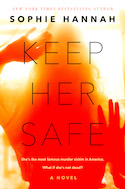
Sophie Hannah excels at slightly paranoid, overly imaginative, furiously curious women who inevitably land themselves in piping-hot water, and, in Keep Her Safe (William Morrow), Cara Burrows is no exception. Off on a furtive, two-week jaunt to a flash Arizona resort, the British Burrows, jet-lagged and on-edge, checks in to her hotel, only to find the room she’s been given is already occupied. Within a matter of hours, Burrows has a bizarre — and top-notch — mystery on her hands: based on what she’s seen in that hotel room, is America’s most famous murder victim actually alive, well and vacationing in Arizona? Hannah’s fully fleshed-out characters and obvious relish for the outrageous tides and sweeps of contemporary media culture fuel this page-turner, while her joy of puzzles quietly contributes its soul.
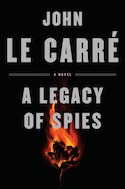
The British Secret Service game is strong in John le Carré’s A Legacy of Spies (Viking). Bookending some of the action of 1963’s The Spy Who Came in From the Cold as well as sharing critical characters with 1974’s Tinker Tailor Soldier Spy, Legacy is narrated by Peter Guillam, close colleague of George Smiley. It appears that some of the Circus’ long-ago spy shenanigans have caught up with them in the present day, and Guillam, summoned to the offices of MI6 from his cozy retirement homestead in Brittany, has some explaining to do. It’s a testament to the ugliness of the current political landscape – which le Carré has fearlessly and vocally addressed in recent novels — that re-visiting the old-school days of a Western intelligence agency provides pure, escapist fun, despite the amoral, duplicitous and exploitative machinations of the agents.
Already in semi-hot water as a witness in a grand-jury proceeding, Darren Mathews, black Texas Ranger, finds himself fully immersed when an FBI pal sends him to check out two homicides in the tiny town of Lark, East Texas. Attica Locke’s terrific Bluebird, Bluebird (Mulholland) simmers with racial tensions, shimmers with unforgiving heat, features a killer soundtrack playing in the background, and offers an early sentence that echoes perpetually throughout the book: “In the wake of Obama, America had told on itself.” But within Bluebird’s deeply atmospheric surround is a story driven by entirely human, individualistic elements — love, fear, entitlement, jealousy — a story told with Locke’s crystal-clear vision and pleasurably elemental prose.
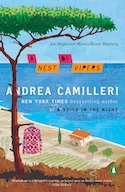
The temptation to stray is, well, tempting in Andrea Camilleri’s A Nest of Vipers (trans. Stephen Sartarelli; Penguin), when Inspector Montalbano is faced with a proper femme fatale while investigating his latest case — the murder of the woman’s father, no less. No sooner has his long-suffering girlfriend, Livia, jetted back home to Genoa, when a dinner invitation-proposal throws him (only temporarily) for a loop. Both fascinated and repulsed by the murder victim who had no qualms about blackmailing and loan sharking an extensive community, Montalbano, true to form, mulls over clues, red herrings and eurekas alike while ingesting the best food Sicily has to offer. Deceptively bordering on cozy, Camilleri’s mysteries never shy away from concealing a dark-black element at their heart.
The Quintessential Interview: JA Jance
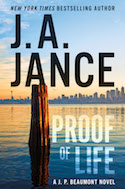
J.A. Jance’s Seattle PI J.P. Beaumont has been on the murder-solving scene since 1985’s Until Proven Guilty, Jance’s first detective novel. Since then, Jance has kept her scores of books band-box-fresh and her prose moving along at a peppy pace. In her latest, Proof of Life, the depth of Beaumont’s career provides rich fodder for the current mystery as now-retired Beaumont finds himself embroiled in the supposedly-accidental death of retired reporter and part-time nemesis Maxwell Cole.
What or who are your top five writing inspirations?
I have no idea! Not only do I not have five — I don’t have one!
Top five places to write?
In my gazebo in the back yard. On the back porch overlooking the garden. In my chair in the family room. On my patio in Tucson. On a cruise ship.
Top five favorite authors?
Jussi Adler-Olsen. Ann B Ross. Lee Child. Daniel Silva. Jo Nesbø.
Top five tunes to write to?
“Crazy” by Patsy Cline. “At Seventeen” by Janis Ian. Mozart’s The Magic Flute. Anything by Anne Murray. Anything by Gentleman Jim Reeves.
Top five hometown spots?
Tea at the Georgian at the Fairmont Olympic. The 5th Avenue Theatre. TechCity Bowl. John Howie Steak. Bridle Trails Red Apple in Kirkland.
Criminal Fiction: (books about) criminals take no vacation
Every month, Daneet Steffens uncovers the latest goings on in mystery, suspense, and crime fiction. See previous columns on the Criminal Fiction archive page
In Melbourne, Australia, The Wheeler Centre has been celebrating all things bookish and literary since 2008, when Melbourne got its UNESCO City of Literature stamp of approval. Among their many events and discussions, the Centre has hosted a bevy of terrific crime-fiction writers and regularly shares videos and podcasts of those talks. Whether you’re a Reacher Creature, or a Kate Atkinson fan, there’s plenty of viewing/listening fun for you here. Other gems include conversations with Ian Rankin, Michael Connelly, Paula Hawkins and Peter James.
Reading around: new titles on the crime fiction scene
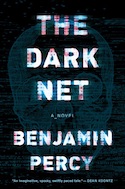
The zippy read that is The Dark Net by Benjamin Percy (Houghton Mifflin Harcourt), is not for the faint-of-heart. Hard-bitten Portland journalist — and Luddite, a personality quirk that comes in mighty handy in this particular context — Lela stumbles on the story of her life — so far — when she trips over an odd-looking skull in a construction site smack dab in the middle of the trendy Pearl District. And things go literally haywire from there. A rich mash-up of suspense, techno-thriller, horror, and the supernatural, Percy pulls it all together with a terrific cast of characters, finely-tuned plot twists and killer prose, sprinkled generously with spot-on snark and fun puns, as well as lovely turns of phrase: “…she hears the call to prayer as it purls and echoes through the city.”
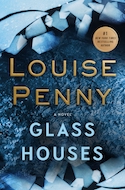
Louise Penny’s detective Armand Gamache of the deceptively cozy and quiet Three Pines Quebecois village, has been a steadfast presence on the mystery scene for more than a decade. Now that he’s tackled and rousted out corruption at the highest levels of the Sûréte du Quebec, what’s left for a Chief Superintendent to do? Plenty, as it turns out. Penny’s Glass Houses (Minotaur), a perfectly-structured novel, opens in a tension-filled Montreal courtroom. Then, the narrative shifts between Montreal and a chilly few days months earlier in Three Pines, when a mysterious figure stood on the village common and freaked everyone out. Penny’s produced a beautifully wrought and pleasurably clever novel about conscience, revenge, and one of the most potent criminal challenges of our time.
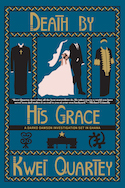
Murder hits uncomfortably close to home in Kwei Quartey’s Death by His Grace (Soho), when Chief Inspector Darko Dawson’s wife’s cousin is killed. The detective deals with heightened familial tensions — not to mention the deterioration of his aging father, the wayward ways of his adopted son, and a bout of malaria — all while working to ferret out a dangerous killer. There’s plenty of delicious Ghanaian food mentions to salivate over and a friendly overview of Accra’s plentiful neighborhoods, but Quartey covers the bad as well as the good: an inherent part of the plot here includes the workings — and cons — of a charismatic church and its self-enriching leader.
In Yesterday (Mulholland), Felicia Yap’s intricate and mind-bending debut, there’s murder with malice aforethought afoot and an ambitious, chess-obsessed detective on the case. But in Yap’s imagined world, unusual challenges abound: human memory is severely curtailed by either one or two days tops, and everyone tries to keep track of changes around them by updating (read: and possibly manipulating) their iDairy entries as best they can. A writer-turned-hopeful-politician and his long-suffering wife appear to be at the heart of the investigation; a vengeful woman appears to hold all the cards. In a novel with not one but four unreliable narrators at its core, you pretty much just have to strap in and go along for the bumplicious ride.
The Quintessential Interview: Ruth Ware
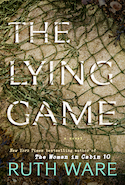
Ruth Ware’s third psychological thriller — and make no mistake, each of her novels melds psychological suspense with proper, page-turning thrills pretty damn flawlessly — is one of those books that breathes vibrant life into the term “atmospheric.” The Lying Game (Scout Press), features a remote and boggy estuary, a decrepit old mill-house, and a local village for local people: this is the setting for the reunion of four grown-up friends who, as girls, teased the people around them with often funny and sometimes cruel mind-games, and who may be about to get their comeuppance.
What or who are your top five writing inspirations?
I never know where inspiration will come from - for In a Dark, Dark Wood it was a chance conversation with a friend about hen nights. The Woman in Cabin 10 was me reading too many Agatha Christie novels, combined with some seriously scary news stories about deaths at sea (Is it me, or has there been a spate of them recently? Maybe it's a case of noticing what you're attuned to). The Lying Game was inspired by a place I visited in northern France (although being a writer, I swiftly snipped it out of its real-life setting and transposed it to the south of England). Online adverts. Books I've read. People I've met. Oh dear, this is more than five, isn't it?
Top five places to write?
I'm having the opposite problem here: I only write at my desk due to having screwed up my back by writing in bed and on the sofa. Bed is probably my very favorite place to write, but I can't really get away with it any more, even with the most artfully arranged pillows. If I can count plotting, then I love thinking while I'm driving or doing mindless, familiar walks — the sort you do every day and could complete almost with your eyes closed. When I lived in London, I did my best plotting on the Tube. I think the key is going into a sort of stasis trance — putting your brain on standby, almost.
Top five favorite authors?
Only five!! This is so hard. Um… Agatha Christie — for a masterclass in plot. Daphne du Maurier for that effortless combination of mystery and emotion. Donna Tartt for creating huge expansive worlds that I love to live in. Shirley Jackson for being simply creeptastic. Patricia Highsmith for creating fully three-dimensional characters who leap off the page and into your head. Wow, that was hard. It's also not complete. There are a whole load of writers I love just as much.
Top five tunes to write to?
Ok, I'm back to having too few answers for this one. I can't write to music; in fact, I really prefer complete silence.
Top five hometown spots?
I'm spending a lot of time on Brighton's Palace Pier, partly because it's a beautiful, crazy throwback to Victorian seaside life, partly as tangential research for my new book. My perfect Brighton day might involve a walk on the pier, throwing some stones into the sea, lunch at La Choza, a truly delicious Mexican restaurant in Brighton's North Lanes, then a drive out into the beautiful Sussex Downs for a drink in one of the country pubs. I love a pub with a proper beer garden – soft green grass underfoot and a wasp trapped under an up-turned beer glass. The Cricketers Arms in Berwick or the Ram Inn at Firle are both excellent. While I am out that way, I might drop into Charleston Farmhouse, once the Sussex refuge of the Bloomsbury circle and now a fascinating period piece, frozen in amber as tribute to them. If I had the energy, I'd finish up by climbing Firle Beacon, but more likely I'd just stretch out in the sunshine, watch the lengthening shadows, and order another glass of wine.
Criminal Fiction: leaving out the parts that the readers skip
Every month, Daneet Steffens uncovers the latest goings on in mystery, suspense, and crime fiction. See previous columns on the Criminal Fiction archive page
A gleeful moment catching a fictional private investigator in the act of comfort-reading an Elmore Leonard novel had me rushing off to re-visit this fun guide to writing. From "Never open a book with weather," all the way to "Try to leave out the part that readers tend to skip," and with a loving nod to the power of hooptedoodle, Leonard’s teasing, detailed advice is pure pleasure.
Reading around: new titles on the crime fiction scene
A car crash has crippled Jane Norton with severe amnesia and left her passenger, David Hall, very much dead in Blame by Jeff Abbott (Grand Central). A note, found on the scene, indicated a suicide attempt on Jane’s part that apparently went horribly wrong. As the book opens, on the second anniversary of the crash, a new note turns up and Abbott’s perfectly-paced thriller catches literary fire, crackling along with a nicely-meshed Jason Bourne-I Know What You Did Last Summer vibe. With Jane’s memory full of gaping holes — she remembers her favorite books, from A Wrinkle in Time to the magical reads of Edward Eager and Lloyd Alexander, but blanks on the accident — we’ve got a literal unreliable narrator on our hands. Abbott, a deft and nimble writer, skillfully steers us through small-community pettinesses and pressures, as well as, yes, the dark evil that lurks — all too often, it seems — deep in suburban territory.
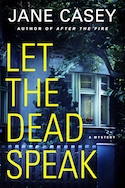
London detective Maeve Kerrigan is back on the case in Let the Dead Speak by Jane Casey (Minotaur). A claustrophobically-short street provides the immersive setting for a bloody crime scene: there’s a profusion of blood, in fact, but the killer appears to have absconded with the corpse. Kerrigan and her team, including fresh meat Georgia Shaw who can’t quite land on Kerrigan’s good side, tangle with a sullen young man with a history of violence, two vulnerable teenage girls, and a family of evangelicals that includes a couple of brothers with some serious sibling rivalry issues. Kerrigan’s ability to home in on people’s deepest, most destructive qualities as well as their inevitable Achilles’ heels — “her trick of understanding more than she should,” as one character notes – keeps the tension level high. Kerrigan and her colleagues’ ability to banter about things like, say, the stability of eyeball fluid when it comes to sampling for the presence of drugs, keeps everything else grounded in grisly police procedural reality.
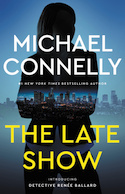
Michael Connelly adds the excellent Detective Renée Ballard to his stable of engaging protagonists in The Late Show (Little, Brown), and, thanks to Connelly’s concise and empathetic writing, Ballard arrives fully-formed, with a heady sense of familiarity about her. Ballard, recently relegated to the night shift (“the late show”) due to illicit politicking by another officer, chases up a credit card robbery, a near-fatal beating, and a “four on the floor” nightclub shooting, which all kick off over a busy night’s work and then overshadow her sleep-deprived days. In between her investigations, she tries to chill out with her paddleboard – there are canny surfing and journalism elements to her backstory – her loyal pooch and her loving grandmother, but much of the book’s blistering action is based around Ballard pursuing the baddies while fighting off some nasty colleagues who have it in for her. Detective Ballard is off to a winning start: she may be short of sleep, but she’s already a legend.
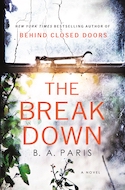
In The Breakdown by B.A. Paris (St. Martin’s), Cass’s apparent dream of a life deteriorates quite quickly when she notices a woman in a car on a lonely stretch of road, and then that woman turns up murdered. Cass has a wonderful husband, a fiercely loyal best friend and a supportive group of colleagues, but the unexpected death plays on her mind and her emotions. Exacerbating an already stressful situation is the fact that her mother died from early-onset dementia and — a fumbled BBQ date here, a slip of memory around a gift there — Cass quickly becomes convinced that she’s suffering from the same familial memory issues. Behind Closed Doors, Paris’s 2016 psychological thriller debut, was one of the more terrifying reads of the year; this follow-up isn’t quite as edgy, but it’s highly engaging nonetheless.
The Quintessential Interview: Bill Loehfelm
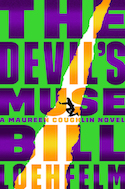
Bill Loehfelm’s New Orleans police officer, Maureen Coughlin, like Loehfelm himself, relocated from Staten Island to The Big Easy where she’s already gappled with high-level corruption as well as more general criminal activities. In The Devil’s Muse, out this month from Farrar, Straus and Giroux, and taking place over the course of a single, tension-tattered night bang-smack in the middle of NOLA’s Mardi Gras festivities, Coughlin has her patience tested by a documentary filmmaker, a nasty new street drug, a neighborhood shooting, and some of her more surly colleagues. Excellent stuff.
What or who are your top five writing inspirations?
I get a lot of inspiration from movies, actually. Both old favorites and something new that really kicks my ass, especially if it has killer dialog.
Songwriters, too. Someone like Jason Isbell, who I’ve been big into lately, can get a whole novel into a four-minute song. That amazes me. When I hear it done well, it makes me want to get to work. Every time I see my friend Kelcy Mae play music, songs that she wrote, I want to go home and write.
My wife, AC, is a great writer and an indefatigable worker. I always want to make sure I’m pulling my weight around the house.
Seeing other artists at the top of their game is always a challenge and inspiration.
And two weird stories I grew up with – Batman and King Kong. Something about those two stories, those two American myths, it’s like there’s something mystical I’m always trying to pull out of them.
Top five places to write?
The last few books I’ve written exclusively at home since I work on a desktop. We have a sunroom at the back of the apartment that works great as an office: it’s almost all windows, and we call it “the lighthouse.”
I take my editing on the road, though. I live in a coffee shop rich neighborhood and I can walk to a handful. My favorite is the Rue de la Course on Magazine Street, which, after a few misguided years as a restaurant, is a coffee shop again.
I like Mojo on the corner of Magazine and Race, too – which many years ago was the original Rue. There’s a cool place on Magazine called the Reservoir, but that’s more of a crepe place now.
Every now and then I hit HiVolt, but like a lot of the new school coffee shops, they close early.
Top five favorite authors?
Picking only five is impossible. Kate Atkinson is the first one that comes to mind. She’s a stone genius. Megan Abbott has done some of the best work of the last ten years that I’ve come across.
Donna Tartt is in a class by herself.
And JK Rowling has to be in there, too. I love her books as Robert Galbraith as well as that other thing she did. I’ll read anything she writes.
And Alice Sebold, too, who I always forget to mention when I make these lists. I’ve worked real hard to imitate her voice over the years. There’s just an edge that she has. I hope to God she writes another book.
Top five tunes to write to?
For the Maureen Coughlin books I lean a lot on local stuff: A small sample:
- “Criminal” — The Revivalists (I write to a lot of their material)
- “Ice Age” — Dr. John
- “Night People” — the Soul Rebels Brass Band
- “The Corner” — Galactic w/Gift of Gab
- “Power” — Juvenile (w/Rick Ross).
Top five hometown spots?
My screened-in porch.
Joey K’s, a restaurant in the neighborhood where we can get an outside table on the corner. I have lunch there almost every Tuesday with friends who are also self-employed artists.
Tipitina’s for live music any time of year.
The Fair Grounds, where they have Jazz Fest every spring – my high, holy season.
Audubon Park, especially the Tree of Life where I married my wife.
Criminal Fiction: Murder most audible
Every month, Daneet Steffens uncovers the latest goings on in mystery, suspense, and crime fiction. See previous columns on the Criminal Fiction archive page
Thanks to a Twitter-tip from Jim Thomsen I’ve been exploring the Writer Types podcast series run by Eric Beetner and S.W. Lauden. Come for the engaging authors interviews — Megan Abbott, Meg Gardiner, Jordan Harper, Lori Rader-Day, Catriona McPherson — stay for the excellent music.
Reading around: new titles on the crime fiction scene
Canny novelist (the Alex Rider series, the new Sherlock Holmes thrillers) and television writer (Midsomer Murders, Foyle’s War) Anthony Horowitz is in his literary element in Magpie Murders (Harper). An excellent two-fer when it comes to crime fiction – the tome features a beautifully-composed Golden Age mystery written by an author whose editor finds herself with a more contemporary mystery on her hands — Horowitz’s clever take on the vintage English mystery genre as well as the often-fraught world of book publishing is one of this year’s most entertaining reads.
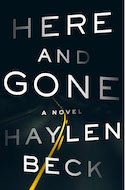
The excellent Stuart Neville’s new foray under his Haylen Beck moniker, Here and Gone (Crown), is about as chilling as psychological suspense novels get. Audra Kinney is trying to free herself and her two kids from an abusive husband, when, in frighteningly rapid succession, she’s pulled over by a cop on a lonely stretch of highway and separated from her kids. The story that transpires digs into some of the darkest corners not just of the Dark Web, but of what sometimes constitutes human motivation. Not as nuanced as Neville’s Belfast-based novels, but a truly propulsive page-turner nevertheless.
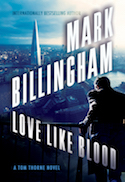
Don’t let Mark Billingham’s stand-up-comedian aspect of his professional life fool you: his crime novels don’t shy away from being pitch-black as well as witty. Love Like Blood (Atlantic), features the welcome return of Billingham’s astute and empathetic London-based detective Tom Thorne, here assisting colleague Nicola Tanner with what seems to be a series of honor killings. As he works to crack the horrific cases with Tanner, Thorne’s on top form, nimbly juggling work, happy domesticity, and forensic details down the pub with best buddy, police pathologist and self-proclaimed “devil’s avocado” Phil Hendricks.
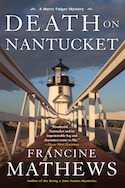
Death on Nantucket by Francine Mathews (Soho) starts off all cosy-like – atmospheric island, a wedding in the works – but quickly veers off into more terrifying territory that includes, in no particular order, dysfunctional family dynamics to the max, poisoned beverages, a semi-mummified corpse, and even a temporary venture into America’s war in Southeast Asia. It’s been 19 years since the last Merry Folger mystery, but the island detective returns in fine fettle here.
The Quintessential Interview: Jason Pinter
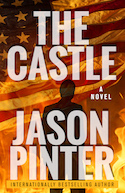
Polis Books publisher by day, Jason Pinter has an authorial track record of his own: in his latest novel, The Castle, Everyman Remy Stanton blocks a crime-in-action on the Upper East Side, and finds himself in the best books of New York businessman Rawson Griggs, who bears amusing similarities to a Manhattan mogul currently based in the White House. Thriller and satire in one, Hoboken-based Pinter’s novel manages to be both escapist and finger-on-the-pulse-spot-on, as well as a fun, fierce ode to the Greater New York Area.
What or who are your top five writing inspirations?
I’ve always had a love for epic tales of good versus evil – as a kid, you could always find me buried in a thousand-page novel by Terry Brooks, Piers Anthony, or Stephen King.
I’m fascinated by what drives good people to do bad things.
The notion that every villain is the hero of his or her own story. (Wouldn’t it be fantastic to read some classic books told from the villain’s perspective? I bet Pennywise has an amazing tale to tell).
Perhaps the thing that most gets my juices flowing is reading a good book. If I’m reading a terrific book, I often feel inspired: the muse comes and taps me on the shoulder, and the little devil tells me to put the book down and go write.
Top five places to write?
My desk at home. It’s cluttered with papers and files and I wouldn’t have it any other way.
Bwè cafe in Hoboken. It’s a homey coffee shop a few blocks from my house. If you walk in there at any time of day, the place is filled with people working on laptops. Great coffee and stable WiFi.
Bookstores. Chain or indie, as long as they have seating, coffee, and WiFi. I love taking a 15-minute break and just walking around, browsing the aisles.
Airplanes. Nothing helps pass a cross-country flight than hitting that groove and knocking out a dozen pages before you land.
Top five favorite authors?
Top five writes who inspired me as a child: Terry Brooks, Piers Anthony, Stephen King, Brian Jacques, and Clive Barker (I was a massive horror hound).
As an adult: Dennis Lehane, Zadie Smith, James Ellroy, Charlie Huston, Dave Barry (Who couldn't use a little more booger humor in their life?)
Top five tunes to write to?
I love writing to movie soundtracks; I have a hard time focusing on writing while lyrics are also playing. My favorite soundtracks to write to are The Social Network, The Bourne Supremacy, and Drive. I’m also a huge Ramin Djawadi fan, so I also love the Game of Thrones soundtrack and, weirdly enough, the Fright Night remake soundtrack. I’m also obsessed with the Hamilton soundtrack (who isn’t?) though that’s more to give me a boost of inspiration to get back to writing. And sometimes hard rock/heavy metal. Hey, I grew up in the 80s and 90s, I’m a Metallica/GN’R guy.
Top five hometown spots?
I’m a New Yorker, born and bred, but now live across the Hudson in Hoboken, so here are the spot that make me want to hop on the Path train at any given moment:
The Strand. Wandering the stacks at The Strand is cheaper and _way _more effective than therapy for me. I collect old first editions of books that have inspired me at some point, and a good portion of my collection has been purchased there.
The Mysterious Bookshop, my home-away-from-home.
The Brandy Library. My wife took me here for my birthday one year, and if you’re a liquor connoisseur, then this is your sanctuary. Their drink menu is—I kid you not—several hundred pages long. We went here soon after the Breaking Bad finale, so I just had to try a Dimple Pinch (note: it was gooooood)
The Comedy Cellar: the best stand-up comedy joint in the country. Don’t bother to fight me on this. The club is literally in a cellar: it’s small and cramped, but this is where the greats go to test their stuff. On separate occasions, I’ve seen Chris Rock and Jerry Seinfeld show up unannounced just to practice new material (I also saw John Mayer do stand-up here, but that’s a whole different story).
Carbone: if you watch Master of None, you’ll recognize it as the restaurant Dev and Jeff eat at (it’s Jeff’s third dinner of the night). The best meatballs I’ve ever had in my life.
Criminal Fiction: May cowers
Every month, Daneet Steffens uncovers the latest goings on in mystery, suspense, and crime fiction. See previous columns on the Criminal Fiction archive page.
With its friendly staff, shedloads of books, and cool author signings, the Seattle Mystery Bookshop is one of the loveliest jewels in the city’s literary crown. Keep an eye on their event calendar , which showcases the best of mystery writers, local, regional, national and international. On the radar for summer: Cara Black, creator of the astute Parisian PI Aimee Leduc, drops in at noon on Wednesday, June 14, and on July 5, the excellent Jill Dawson, over from England, signs The Crime Writer, her canny fictional melding of Patricia Highsmith, a sleepy Suffolk village, and a spot of murder.
Reading around: new titles on the crime fiction scene
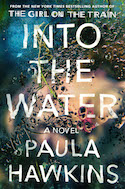
A river with a forebodingly named spot called the Drowning Pool features as a key element in Into the Water (Riverhead). Paula Hawkins’s turbulent follow-up to 2015’s unstoppable Girl on the Train, this psychological thriller is just as rife with twists and turns, but is set compactly in a northern English village, rather than a London suburb. The rural setting lends itself beautifully to the mysteries at hand — a suspiciously high number of people have met their end in the Drowning Pool — and Hawkins has enormous fun with a wide swathe of rotating narrators. She ventures into seriously dark psychological and societal territories here, not the least of which being the hypocrisy and violence that often lies indelibly at the heart of even the smallest of communities.
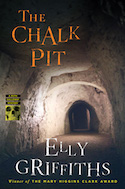
A cache of bones discovered in a medieval tunnel beneath the city of Norwich piques the interest and curiosity of forensic archaeologist Ruth Galloway in The Chalk Pit by Elly Griffiths (Houghton Mifflin Harcourt). But things quickly take a particularly sinister turn as Galloway’s former lover and policeman colleague, DCI Nelson, begins to investigate a series of mysterious disappearances and deaths in the region: from the homeless population to yuppie communities, no one, it seems is safe. Griffiths nimbly weaves a proper police procedural with a gimlet-eyed take on finger-on-the-contemporary-pulse social issues, as well as immersing her characters in ginormous life changes.
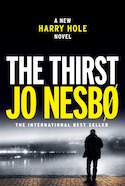
The specter of nefariously used social media — Tinder, in this case — raises its ugly head in The Thirst by Jo Nesbo, translated from the Norwegian by Neil Smith (Knopf). But, this being a Nesbo novel featuring the Oslo detective Harry Hole, there’s so much more here than meets the eye, particularly as Nesbo is a master at finely drawn characters: one of the most powerful elements of his thrillers lies in the ways in which his characters interact with and affect each other. Hole — who recently left the police force for the relative safety of a teaching role and is enjoying the more mundane pleasures of life, such as attending Sufjan Stevens and Sleater-Kinney concerts with his stepson — is commandeered back onto an increasingly terrifying case that encompasses vampirism, Shakespeare’s Othello, and crimes both grisly and grim. Excellent, as always.
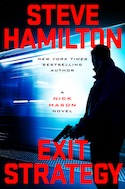
Nick Mason is still in death-threatening thrall to crime boss Darius Cole in Exit Strategy by Steve Hamilton (Putnam), and it doesn’t get more complicated than tampering with America’s Federal Witness Protection Program — especially when a baddie escapes custody with Mason’s killing on his mind. A fiery, muscular narrative that travels at relentless speed, Exit Strategy is a page-turner, yes, but also a tale of loneliness at its most extreme.
The Quintessential interview: Dennis Lehane
I’ve been a fan of Dennis Lehane since 1994’s A Drink Before the War, which introduced his fiercely compelling and complicated Boston PIs Patrick Kenzie and Angela Gennaro. One of our finest writers, Lehane has added high-profile television credits to his name (The Wire, Boardwalk Empire) and has seen several of his novels transformed into critically acclaimed movies. Since We Fell (Ecco), his new standalone and his first novel told from a woman’s point of view, is vintage Lehane: smart, taut, beautifully written, and not to be missed.
Catch the L.A.-based Lehane at Elliott Bay Book Company on June 5 at 7 p.m.
What or who are your top five writing inspirations?
- Boston
- Bills
- Music (dependent on the book, dependent on the mood
- My daughters (see #2 again)
- My childhood
Top five places to write?
- Writing desk, top floor of my house
- Home office
- Diners and coffee shops (but never a Starbucks)
- Pubs
- Anywhere with an ocean view
Top five favorite authors?
- Richard Price
- Raymond Carver
- Elmore Leonard
- Graham Greene
- William Kennedy
Top five tunes to write to?
This is an ever-changing list. I would conservatively say there are at least 700 songs on my Infinite Writing Playlist and 14,000 in my iTunes library. But for the sake of argument, this would be 5 in constant rotation right now:
- "Birds Trapped in the Airport," Craig Finn
- "We Belong Together," Rickie Lee Jones
- "A Dustland Fairytale," The Killers
- "Slipped," The National
- "Jisas Yu Holem Hand Blong Mi," Hans Zimmer
Top five hometown spots?
- Playa Provisions, Playa del Rey
- Mo’s Place, Playa del Rey
- Scopa, Venice
- Good Stuff, El Segundo
- Bodega, Santa Monica
Criminal Fiction: blood in the cut
Every month, Daneet Steffens uncovers the latest goings on in mystery, suspense, and crime fiction. See previous columns on the Criminal Fiction archive page
The 2017 Theakston Old Peculier Crime Novel of the Year longlist offers a cornucopia of marvelous mysteries and terrific thrillers, all published in paperback in the UK and Ireland between May 1, 2016 and April 30, 2017. This list includes multiple crime-fiction gems, including Alex Marwood’s seriously dark Darkest Secret, Mick Herron’s canny spyfest Real Tigers, Christopher Brookmyre’s fiendishly clever Black Widow, and Stuart Neville’s suspenseful and heartbreaking Those We Left Behind. Plus, it’s always a pleasure to find industry giants (Val McDermid, Ian Rankin, Mark Billingham) rubbing writerly shoulders with relative newbies such as Sabine Durrant, Sarah Hilary, Susie Steiner, and Eva Dolan. Get reading! The shortlist is out on May 20.
Reading around: new titles on the crime fiction scene
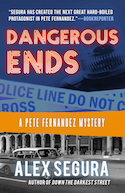
Pete Fernandez is off the sauce and making an okay living as a low-profile PI in Miami, but trouble finds him once again in Dangerous Ends by Alex Segura (Polis). His irregular work-partner-in-crime, Kathy Bentley approaches him with a book project about the legendary Gaspar Varela, incarcerated for killing his own wife while insisting on his innocence, and her plan yields a rich seam of noir-dark mystery that intertwines intriguingly with Fernandez’s own family story. Segura keeps the sultry atmosphere of Hernandez’s love-life strifes turned way up, matched perfectly by southern Florida’s palpable heat and humidity.
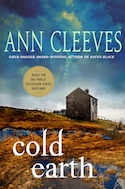
Ann Cleeves does not plot her tightly-knit mysteries ahead of time, so it’s good fun to imagine how she negotiated her way from the humdinger of an opening of Cold Earth (Minotaur): within the first few pages, a landslide brought on by relentless rains in Shetland rides roughshod over an ancient cemetery — during a funeral, no less — leaving a single fatality in its path. The remote island community and Shetland’s brooding Inspector Jimmy Perez are the perfect complement to a landscape both rugged and windswept. But even here, life comes at you fast, whether it’s murder, malice aforethought, petty politics, or budding romance.
There’s something terribly amiss in London in Ragdoll by Daniel Cole (Ecco). For one thing, detective William Fawkes, aka Wolf, is back on active duty after violently attacking a suspect in a courtroom four years earlier. For another, someone has just murdered six victims and sewn them together to make a single, gruesome corpse, one of whose fingers appears to be pointing directly into Fawkes’s nearby flat. The multiple plot lines have a manic erratic-ness to them, that sometimes adds, sometimes detracts from Cole’s careening debut.
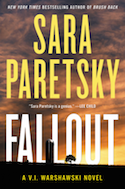
The disappearance of a young filmmaker following the ransacking of the gym where he held a day-job, kicks off the action in Fallout by Sara Paretsky (William Morrow). Luckily, for the filmmaker, he is a cousin of Chicago PI V.I. Warshawski, who is soon hot on the case. In a terrific, decades-spanning mystery that takes Victoria Iphigenia deep into the heart of a rural Kansas community, master-at-work Paretsky has multiple twisty aces up her sleeve, nicely enhanced with a rich cast of characters, a lovely shout-out to the super-speedy stock-car racer Danica Patrick, and multiple spirited reminders that here in these United States of America, the government is supposed to for We the People.
The Quintessential Interview: Lori Rader-Day
Lori Rader-Day sets her psychological thrillers in restricted, restrictive spaces — a tattered motel, an academic campus, a small town — which instantly projects their claustrophobic-tension levels into the stratosphere. The Day I Died, out this month from William Morrow, started life ten years ago as a short story; this extended version packs a powerful, sinister punch, with handwriting analyst Anna Winger trying to help the local police force locate a missing child and finding her own life spiraling rapidly out of control.
What or who are your top five writing inspirations?
Gossip: What people whisper about is what they care about. Weird news stories I find on Facebook: I save them, never knowing if they'll come into use. Other writers: I love hanging out with them and listening to them talk shop and process. Throwaway facts in nonfiction books that really need their own books. Deadlines.
Top five places to write?
A little desk in my guest room known as my "office." It's tiny. Starbucks: They have really good hot tea. Any cafe, actually: I like cafe noise – but not coffee. My backporch, in good weather and in rain. Airplanes, if I have enough elbow room: On the way to Left Coast Crime in Phoenix, I had my own row. Life highlight.
Top five favorite authors?
I'm going to go historical, to avoid making enemies: Agatha Christie. Shirley Jackson. Josephine Tey. Daphne du Maurier. Dashiell Hammett, but when I say this, I mean The Thin Man.
Top five tunes to write to?
Depends on what I'm writing. I make a playlist for every novel. These five songs helped me write The Day I Died:
- Blood in the Cut by K. Flay
- White Blank Page by Mumford & Sons
- Lucky Now by Ryan Adams
- Go Insane (Live) by Lindsey Buckingham
- Break Free by Matthew Santos
Top five hometown spots?
My real hometown is pretty small, so I'll tell you about Chicago, my adopted hometown: On Lake Michigan, out in water looking back on the city. The Book Cellar, one of Chicago's amazing independent bookstores. The Forest Preserve, in the woods, on a bike, with my husband. I need to do this more. Caro Mio, Italian restaurant with my girlfriends. Just add wine. Winter Garden, Harold Washington Library, which is a glass-ceilinged room with a view of the surrounding skyscrapers. It's just a very Chicago place.